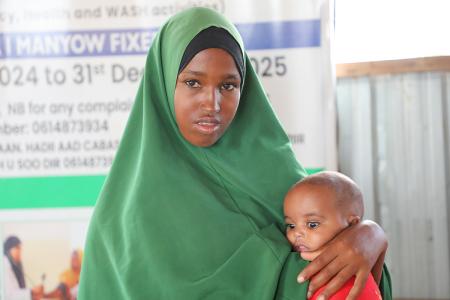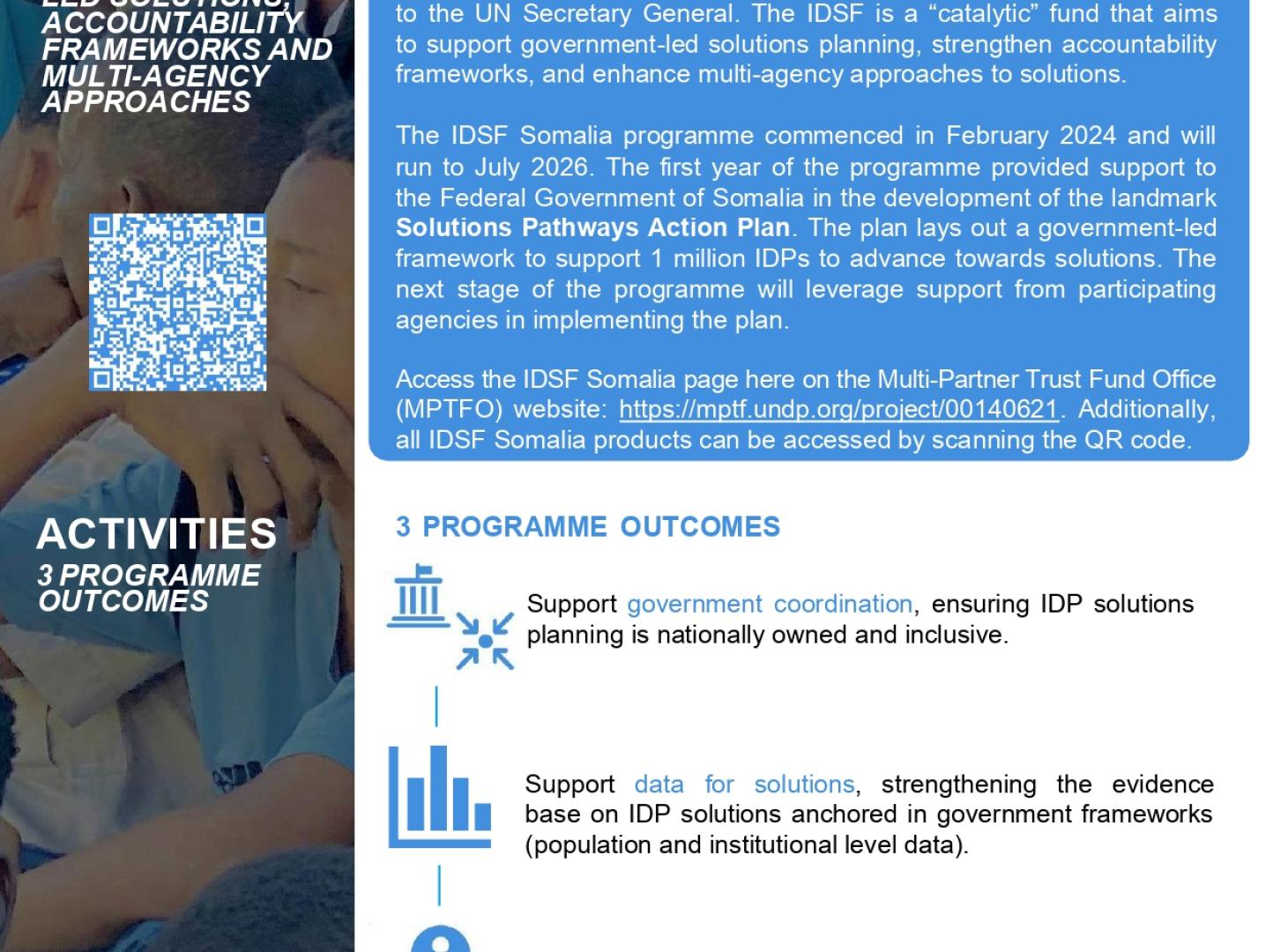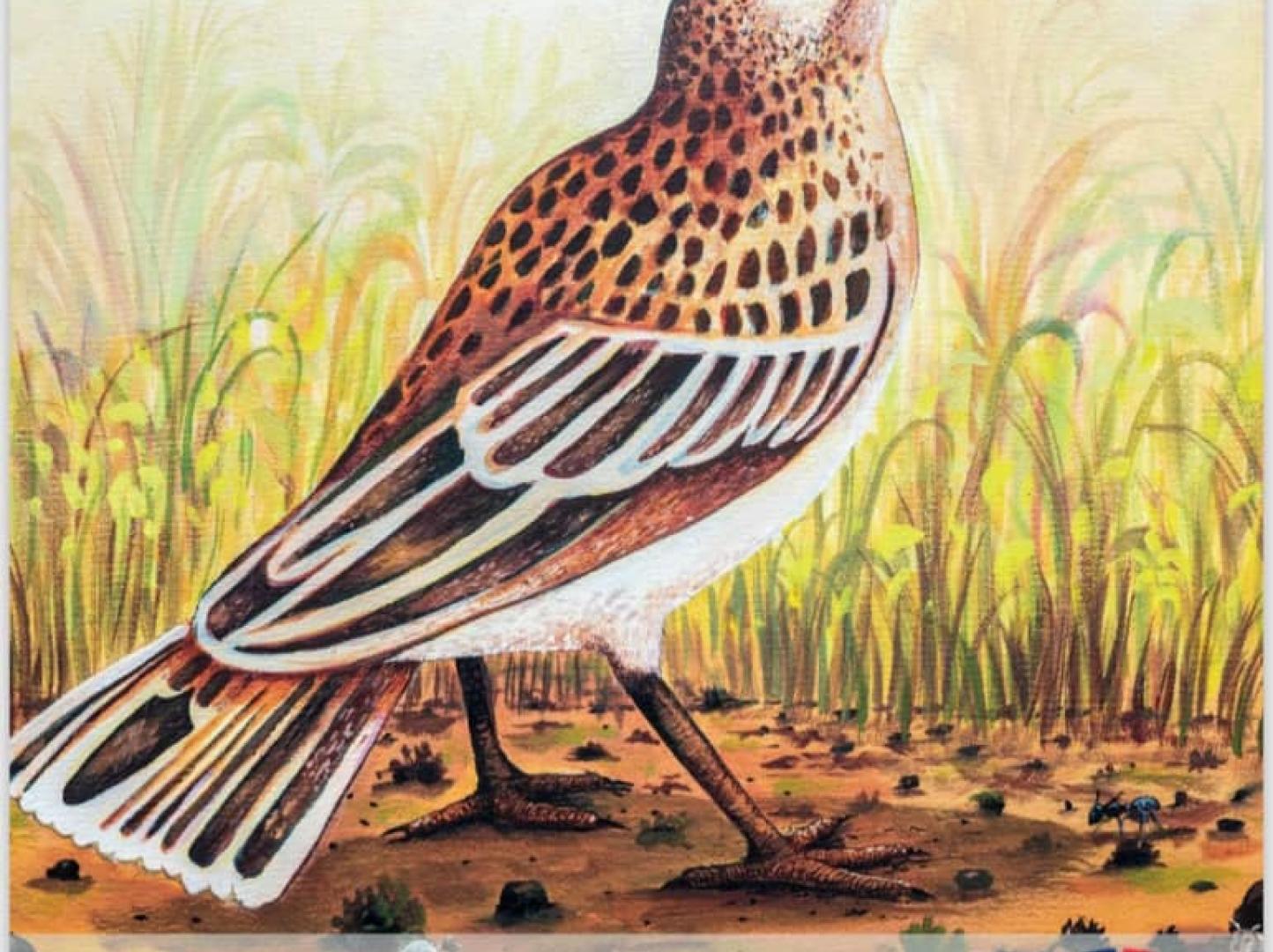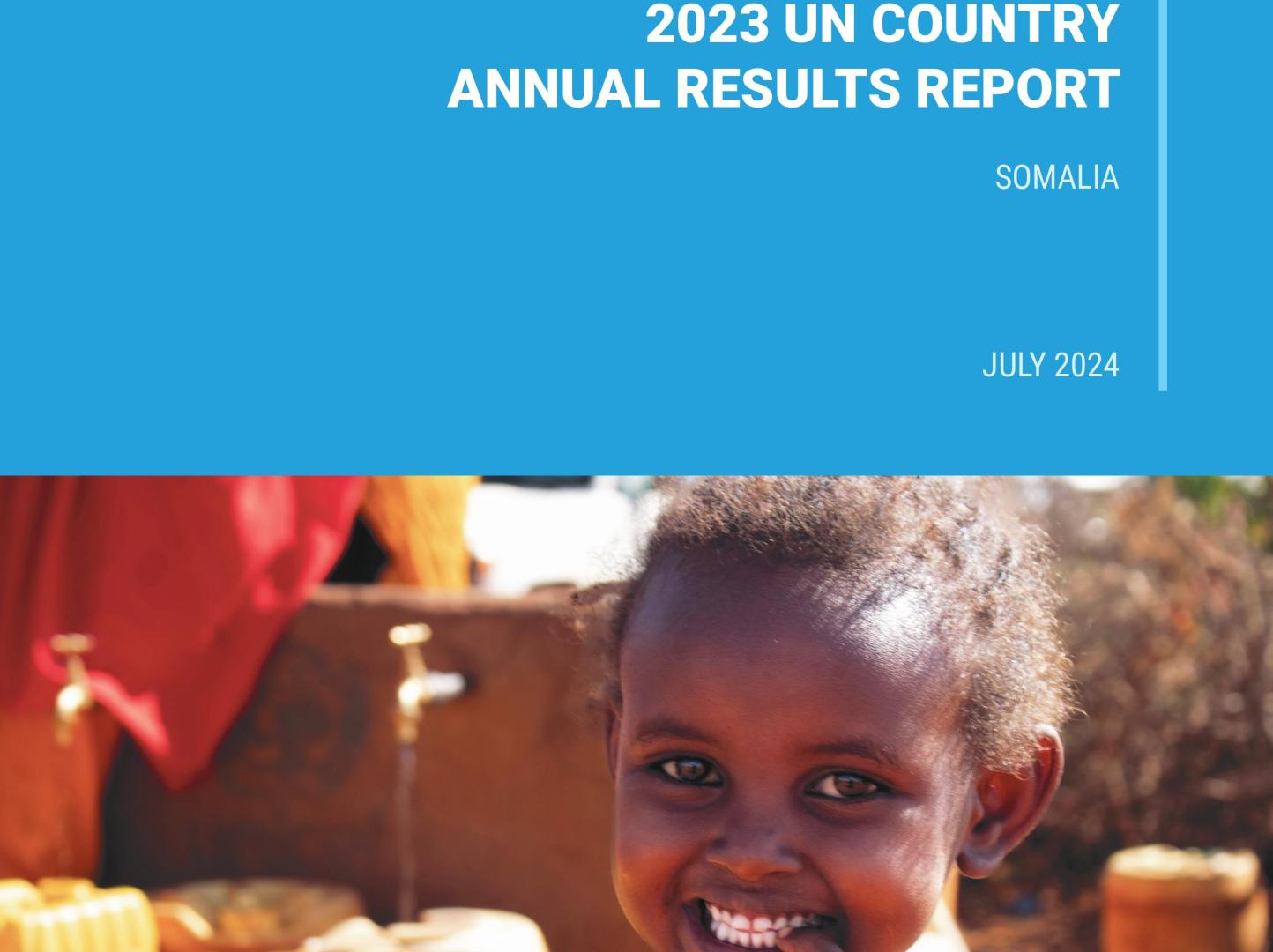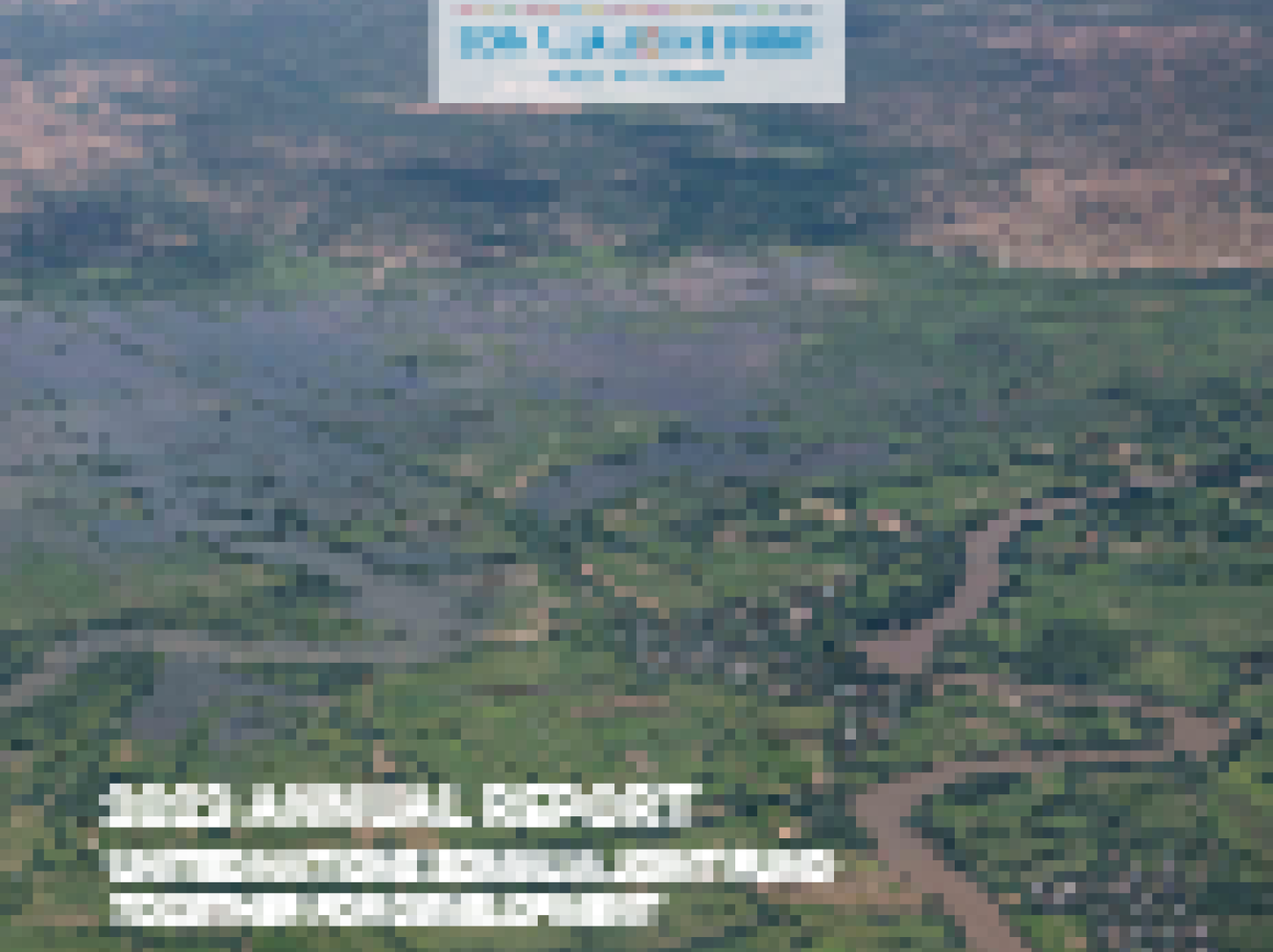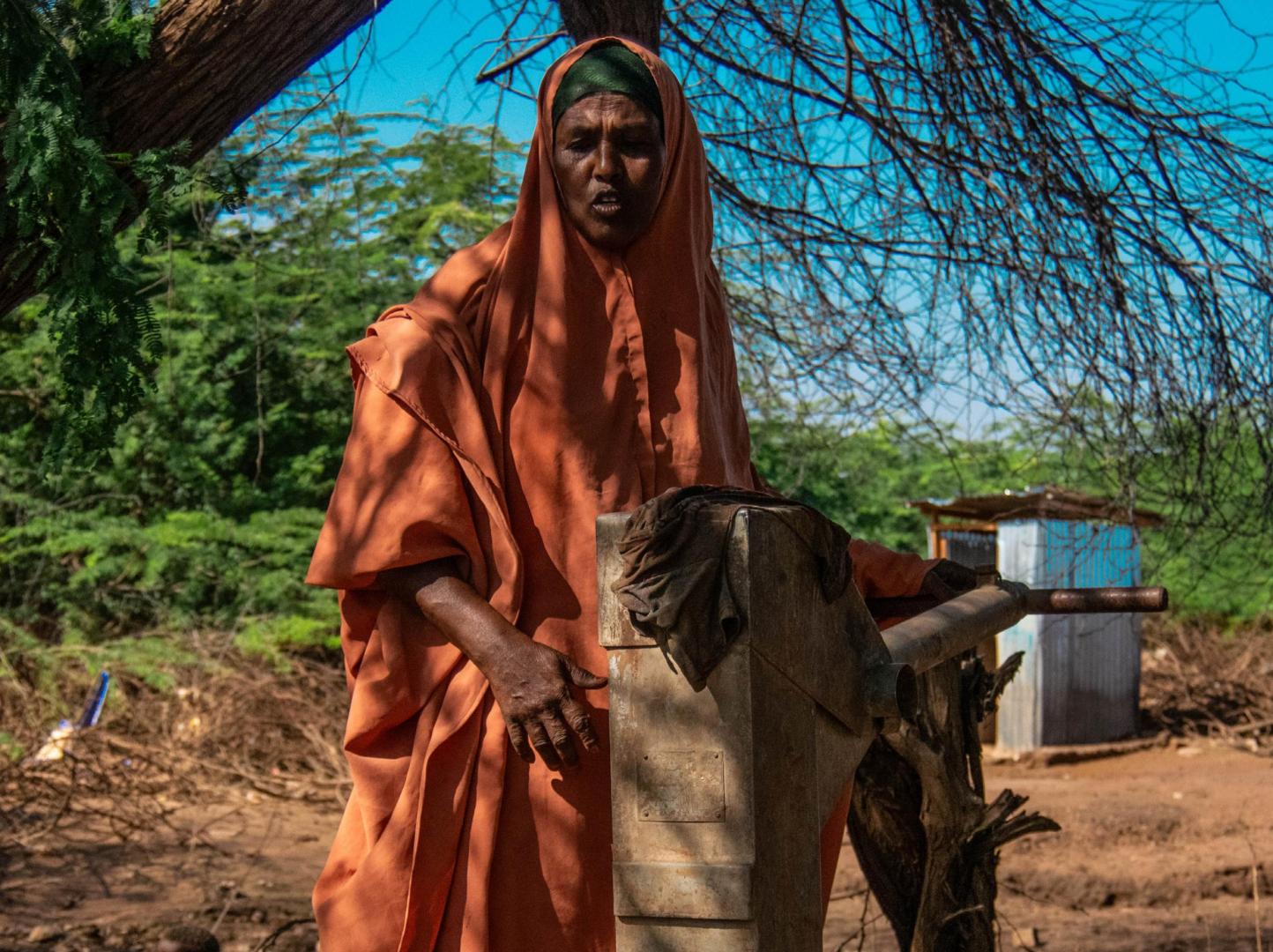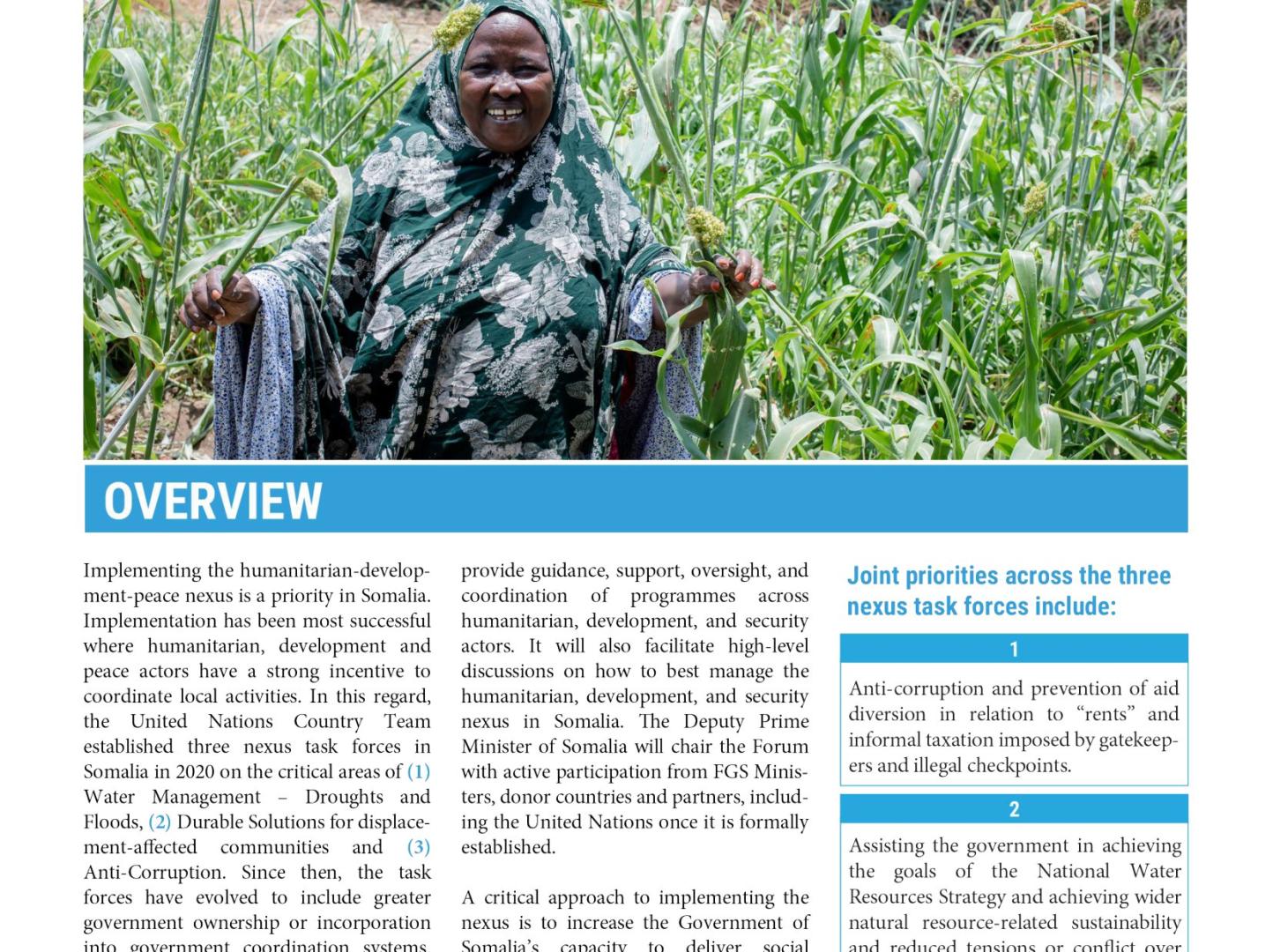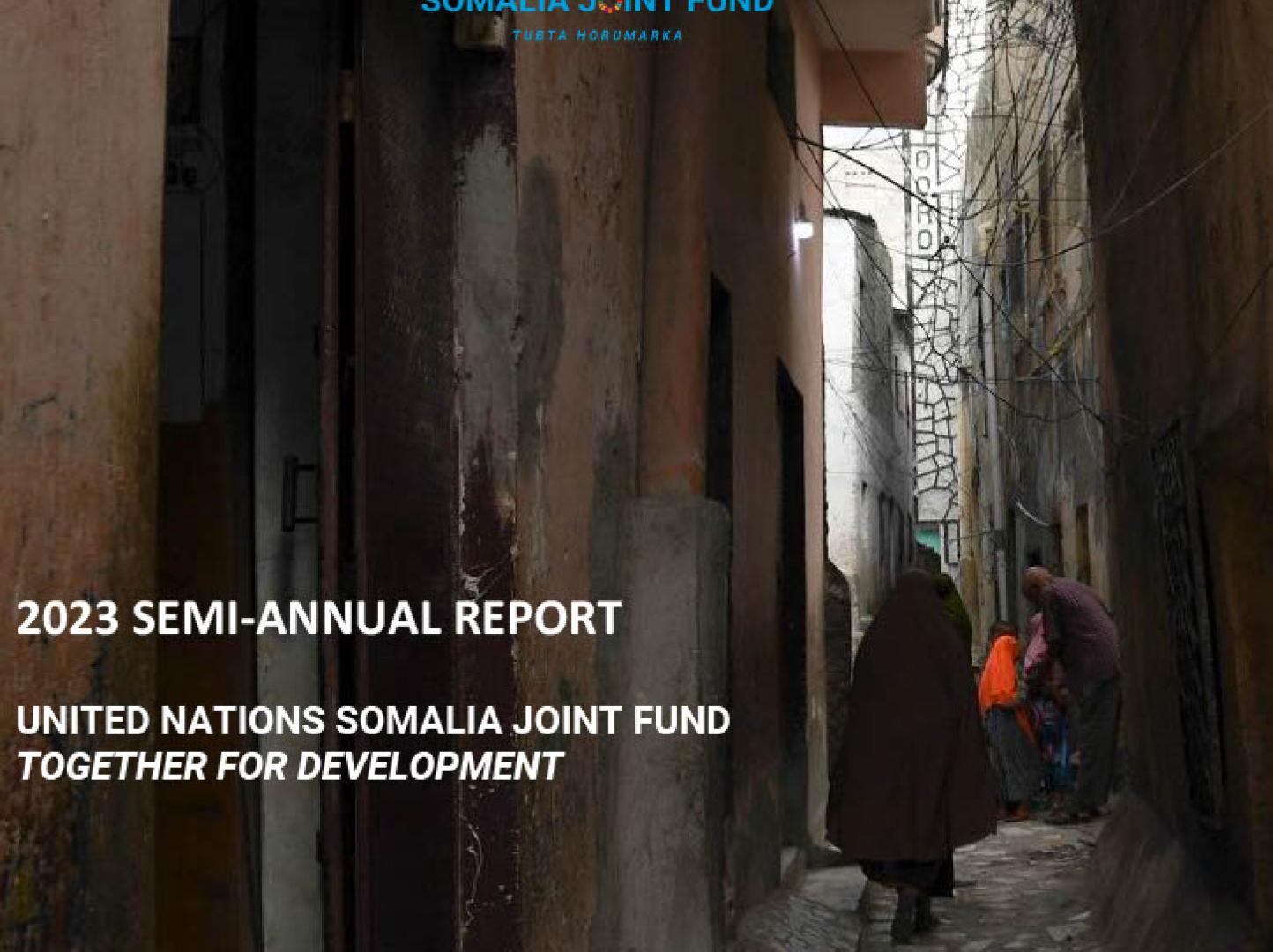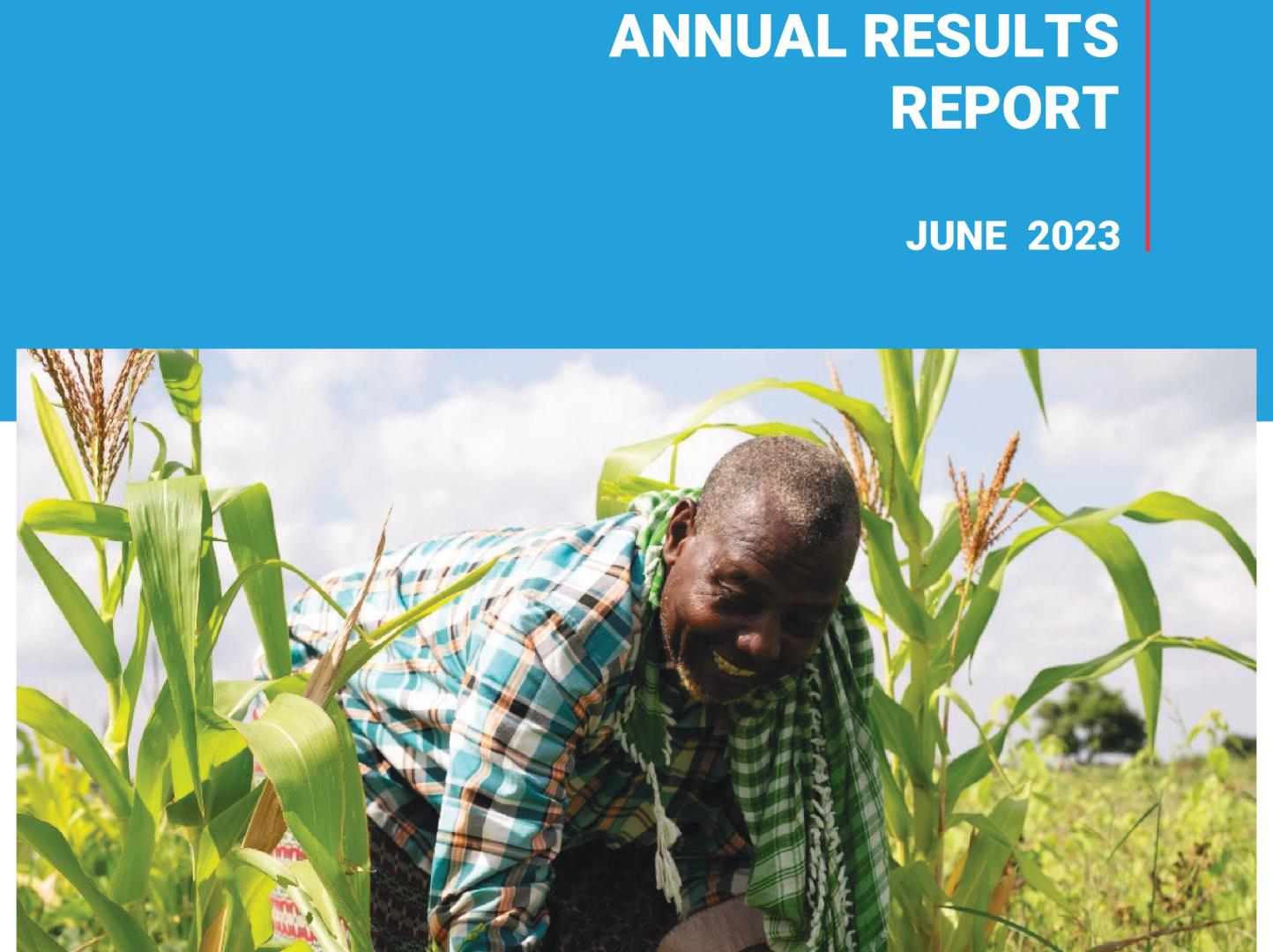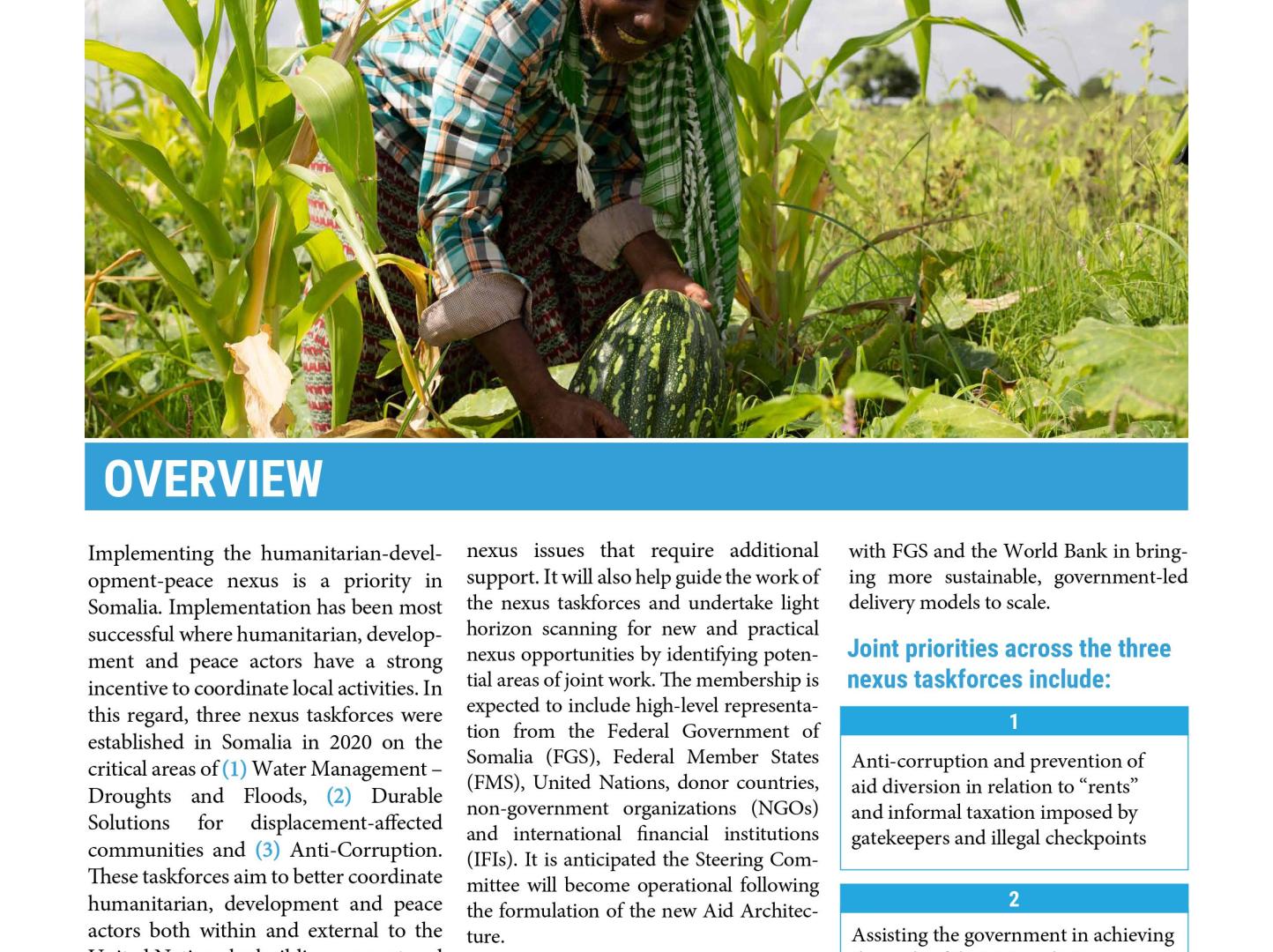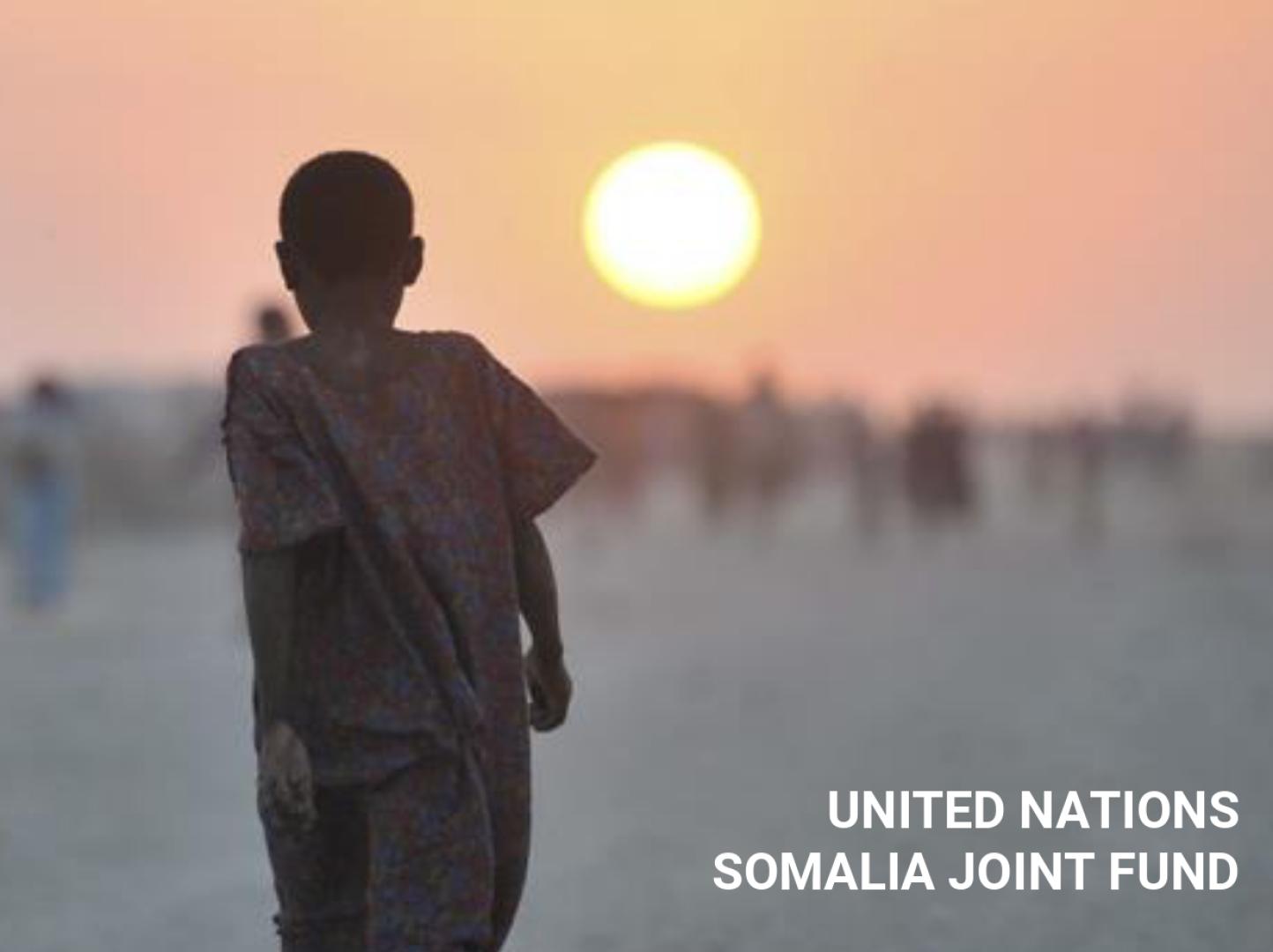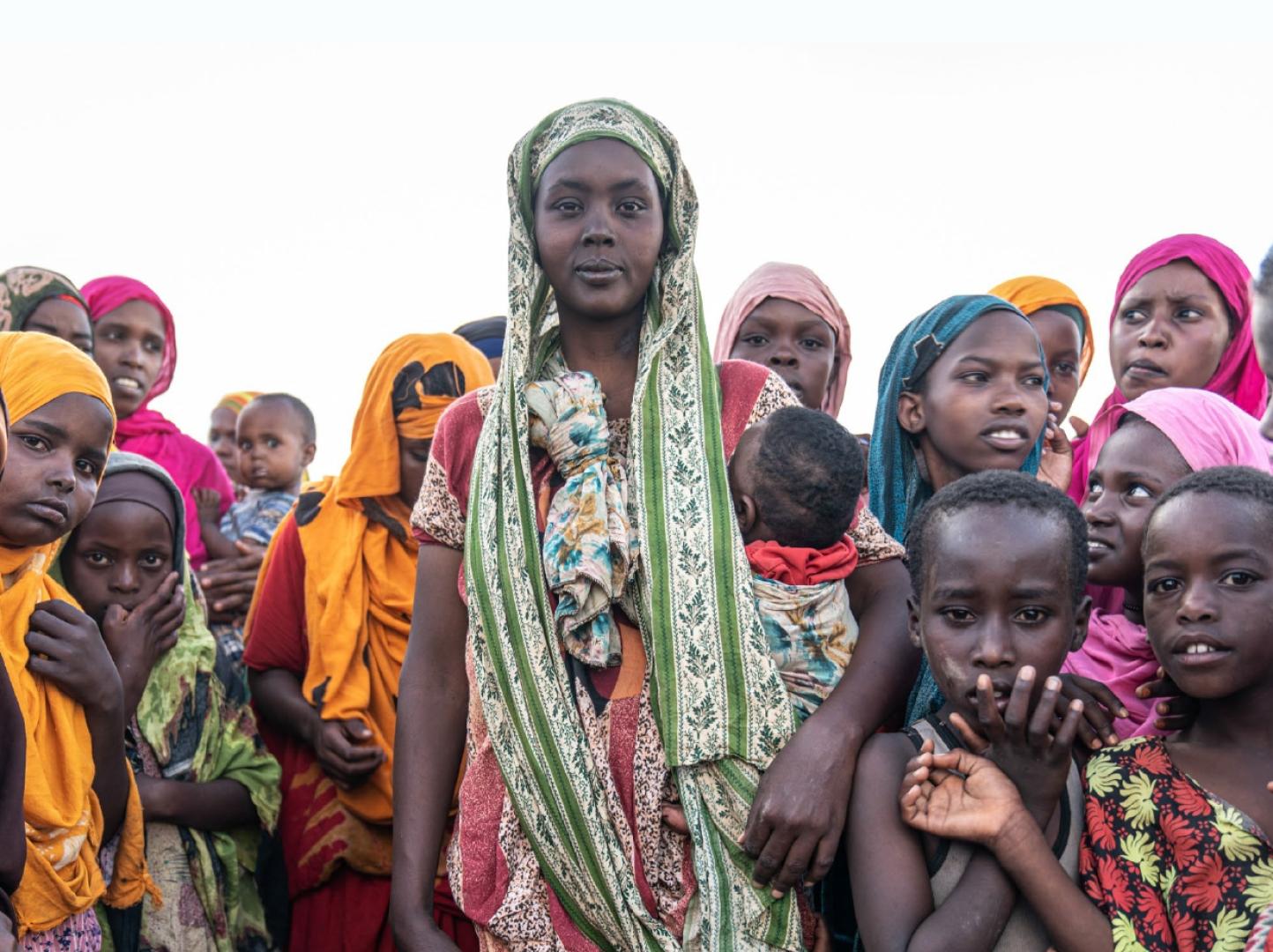Latest
Story
10 June 2025
A round-up of activities of the UN system in Somalia in May 2025
Learn more
Story
05 May 2025
A round-up of activities of the UN system in Somalia in April 2025
Learn more
Press Release
23 April 2025
Somalia launches lifesaving vaccines to prevent pneumonia and diarrhoea in children
Learn more
Latest
The Sustainable Development Goals in Somalia
The Sustainable Development Goals are a global call to action to end poverty, protect the earth’s environment and climate, and ensure that people everywhere can enjoy peace and prosperity. These are the goals the UN is working on in Somalia:
Story
19 November 2024
Irrigation project pour forth for displaced Somalis in Baidoa
Baidoa – Aden Sheikh Issack has a small allotment on an eight-acre communal farm in Barwaqo, a small settlement of internally displaced people (IDPs) on the outskirts of Baidoa in Somalia’s Bay region. He fled there when the conflict and hunger in his former residential area became too much to bear.At first, it was not easy surviving as a displaced person with large family but – with some external assistance – the farm has become productive and allows him to look after his wife and 11 children, as well as sell extra produce to local markets.The 50-year-old was proud to show off his farm recently to visit from the Somalia Joint Fund (SJF) – a multi-donor fund supporting Somalia’s development priorities. The visitors included representatives of the Somali government and the United Nations, and they had come to see firsthand the impact of the irrigation project which has ramped up the farmer’s output of maize, sugarcane and vegetables.“The irrigation project has been very beneficial, and we are already seeing its positive impact. I have been a beneficiary of this project since 2019 and I see better days ahead,” said Mr. Issack during the delegation’s recent visit to Barwaqo.Like Mr. Issack’s family, many local households have benefitted from the SJF’s Saameynta (transl.: ‘impact’) Programme – an eight-acre solar-powered, micro-irrigation drip serviced by a communal borehole, and set up to assist IDPs on land provided by the government.“This farm supports 57 families, with the smallest family having six members. This means we are talking about a minimum of 340 people. The total number is around 400 to 500 people and, out of the 57 families, 43 are led by women, including single mothers,” said the Director of Coordination and Monitoring in the federal government of Somalia’s Ministry of Planning, Mahamud Sicid Nur, told the visiting delegation.The four-year project will directly support 25,000 households and indirectly assist 150,000 people in South West State and Puntland, in the country’s north, by the end of 2025. International supportThe Saameynta Programme aims to provide durable solutions and scale up investments in mixed-use land development packages through drip irrigation, infrastructure improvement and small-scale business expansion. It is jointly implemented by the UN Development Programme (UNDP), the International Organisation for Migration (IOM) and the UN Human Settlements Programme (UN-Habitat), with funding provided through the SJF.According to the SJF’s manager, Peter Nordstrom, Saameynta has made important contributions to improving the economic status of displaced families. “The benefits of drip irrigation in arid or semi-arid environments are evident and its potential for creating sustainable livelihoods for communities is significant,” Mr. Nordstrom said.“At the same time,” he added, “access to land is at the heart of durable solutions for Somalia’s displacement crisis. Here in Barwaqo, the municipality has generously provided the land used for this communal farm but it is only serving a small portion of the IDP population.” Local authorities are keen to expand the project after having experienced its benefits.“In the past, we used to space the crops by about two metres when planting, but now we only space by 10 centimetres due to drip irrigation. This approach is new to us, and we are really impressed by the increased production,” Mr. Isaack told the visiting delegation.“Drip irrigation has also reduced our harvest times,” he continued. “We used to wait three months to harvest, but now we can harvest in just 15 days.”The trip was the SJF’s first joint UN-government monitoring mission, giving participants a firsthand look at the progress of ongoing programmes in the region. It was designed to explore synergies and to strengthen linkages within the SJF portfolio on the ground so as to facilitate more effective monitoring, foster learning and maximize impact through strategic collaboration and coordination between among the Federal Government of Somalia, local authorities and the United Nations.The visit also served as a platform for engaging directly with local authorities and community members.“Previously, displaced persons used to depend on aid, but now they have transitioned into farmers, producing their own food,” said the South West State’s Minister of Planning, Economic Development and International Cooperation, Hussein Mohamud Sheikh Hussein. “They are now food secure and sell any surplus to earn income,” he added. “This shows that we are gradually shifting from food dependency to self-sufficient farmers.”Critical funds Launched in 2023, the SJF is a multi-donor trust fund backed by Canada, Norway, Netherlands, Sweden, Switzerland and the European Union. It aims to strengthen partnership between the Somali Government, the United Nations and international partners in support of Somalia’s national development priorities and the achievement of the Sustainable Development Goals. Country-level pooled funds like the SJF are critical for the United Nations’ ability to better support development aspirations of the countries it operates in through the provision of the necessary flexibility to respond to complex challenges facing Somalia and to maximize synergies across the UN system through joint action.Originally established in 2014 and formerly known as Somalia Multi-Partner Trust Fund, the SJF is also one of the largest country-level development funds globally with more than $500 million in contributions since inception.
1 of 3
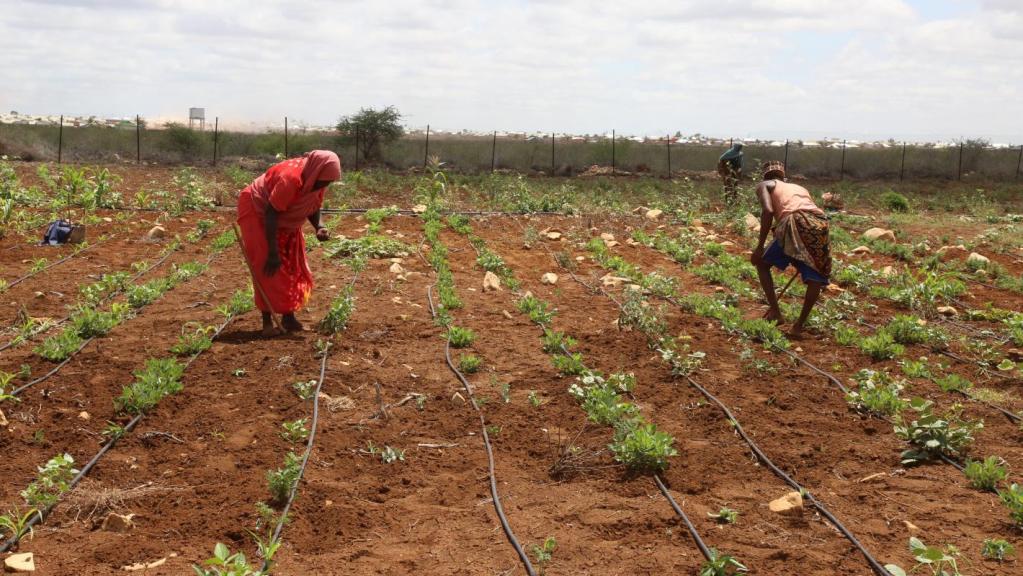
Press Release
02 July 2024
Federal Government of Somalia and United Nations convene the 2024 meeting of the Joint Steering Committee of the UN Cooperation Framework for Somalia (2021-2025)
The meeting of the Joint Steering Committee was co-chaired by the Minister for Planning, Investment and Economic Development, His Excellency, Mohamud A. Sheikh Farah (Beenebeene) and the UN Deputy Special Representative of the Secretary-General, Resident and Humanitarian Coordinator for Somalia, Mr. George Conway. His Excellency. Mohamud A. Sheikh Farah (Beenebeene) acknowledged the significance of the partnership in support of Somalia’s development priorities. “The Cooperation Framework is a testament to our strong partnership with the UN, driving forward our national development agenda and the Sustainable Development Goals (SDGs). We are committed to ensuring that the progress we make together translates into tangible improvements in the lives of the Somali people,” said, Minister, Mohamud.Speaking during the event, Mr. George Conway explained the annual Joint Steering Committee for the UN Cooperation Framework provides a platform to take stock and recalibrate our engagement to ensure alignment with the vision and aspirations of the country.“Five-year plans such as the UN Cooperation Framework are important to hold us accountable to commitments made. Under leadership of His Excellency the President, Somalia is conceiving a centennial Vision 2060 that seeks to capture Somali aspirations for their country. Providing a longer-term vision to guide short- and medium-term efforts will be helpful both in the finalization of the next National Transformation Plan as well as our next UN Cooperation Framework," said, Mr. Conway. The UN Sustainable Development Cooperation Framework (2021-2025) is the UN's multi-year strategic plan to guide the UN’s collective contribution to the realization of the 2030 Agenda for Sustainable Development and the Sustainable Development Goals in Somalia.—————————————————————————————————— FOR MEDIA INQUIRES: Communication Unit Department, Ministry of Planning, Investment and Economic Development | Email: Info@mop.gov.so Abdilatif Adan, Communications Specialist, UN Resident Coordinator Office in Somalia | Phone: +252614125028 | Email: abdilatif.adan@un.org | https://somalia.un.org/en |
1 of 3
Story
21 December 2021
Somalia is on the path of recovery, but real challenges remain
I arrived in Somalia in September 2019, two decades after having worked here previously. I knew that I was taking up a challenging assignment, but I was also looking forward to seeing Somalia’s progress. Afflicted by decades of conflict, recurrent climatic shocks, disease outbreaks and poverty, Somalia was often called a ‘failed state.’ The narrative is now changing, and although fragile, Somalia is on a path to stability and the resilience of the Somali people is second to none. That said, we are not under any illusion: significant challenges remain, and we must work even harder to preserve the gains made to date. Somalia’s upward trajectory is evident in the construction boom, as one analyst noted -- the sound of the hammer is replacing the sound of gunfire in Somalia’s capital.
The UN has been closely supporting the Somali people since the birth of the Republic in 1960. Currently, the UN's various mandates are implemented through 26 Agencies, Funds and Programmes (both resident and non-resident), one political mission (UNSOM) and one logistical support mission (UNSOS). The UN’s commitment towards the Somali cause is articulated in detail in the UN Sustainable Development Cooperation Framework (UNSDCF 2021-2025), mirroring the priorities of Somalia’s Ninth National Development Plan (NDP-9).
At the height of the COVID-19 pandemic, the UN marshalled support to help the Somali government respond to the virus outbreak. We continue to support the Somali authorities in seeking to defeat this pandemic and encouraging people to get vaccinated. Elections are also on-going in Somalia. The UN is supporting the process to ensure that elections are held in a peaceful and transparent manner, while at the same time advocating for 30 per cent women’s quota in the Somali legislature.
While these are encouraging signs of progress, we must not forget Somalia’s long-standing challenges. According to UN’s projections for next year, an estimated 7.7 million Somalis (nearly half of the country’s population) will require humanitarian assistance and protection. Women and children continue to bear the brunt of Somalia’s complex humanitarian crises, especially among the internally displaced communities. In light of the current serious droughts, the Somali government declared a humanitarian state of emergency on 23 November. Yet, neither the government nor the humanitarian community has adequate resources to respond. With a few days remaining in the year, the 2021 Humanitarian Response Plan which seeks US$1.09 billion remains only 70 per cent funded. Additional resources are urgently needed to prevent the dire humanitarian situation from becoming a catastrophe, so we continue to engage partners on this subject. In this regard, I undertook missions to Europe in October and to the Gulf in September. Throughout my interactions with partners, I stressed the need for additional funding to address Somalia’s escalating humanitarian crisis and elaborated on how inaction not only risks a reversal of the gains but puts the lives of millions of Somalis in jeopardy.
Through my field visits in Somalia, I have also seen first-hand the grim realities of adverse climate conditions. Somalia is no doubt on the frontline of climate change. The recurrent droughts and floods are driving widespread displacement, rapid urbanization, hunger, malnutrition and poverty. Climate change is also increasingly seen as the driver of conflict and a threat to the country’s security as the struggle over meagre resources deepens divisions. In addition, the loss of traditional livelihoods makes people vulnerable to recruitment by armed groups such as Al-Shabaab. Somalia is currently experiencing a third consecutive season of below-average rainfall, with nearly 80 per cent of the country experiencing drought conditions, water shortages and livestock deaths. One in five Somalis does not have enough water to cover his/her basic needs. On a positive note, as part of the efforts to mitigate the climate emergency, the government, with the support of the United Nations, has recently adopted an ambitious Nationally Determined Contribution to achieve global climate targets, in which Somalia committed to reduce its greenhouse gas emissions by 30 per cent by 2030.
Somalia’s crises are multifaceted, and they require comprehensive solutions from all stakeholders. It is our collective responsibility to support the efforts of the Somali people to cope with these crises and find lasting solutions that build resilience against future shocks. We must not fail the people we pledged to serve.
Adam Abdelmoula, Deputy Special Representative of the UN Secretary-General, Resident and Humanitarian Coordinator for Somalia, held a press conference on Monday, 20 December on the situation in Somalia, where the UN and partners is launching a nearly $1.5 billion Humanitarian Response Plan (HRP). Roughly 7.7 million people in the country will need assistance and protection in 2022, a 30 per cent rise in just one year.
Written by Adam Abdelmoula, Deputy Special Representative of the UN Secretary-General, Resident and Humanitarian Coordinator for Somalia
1 of 3
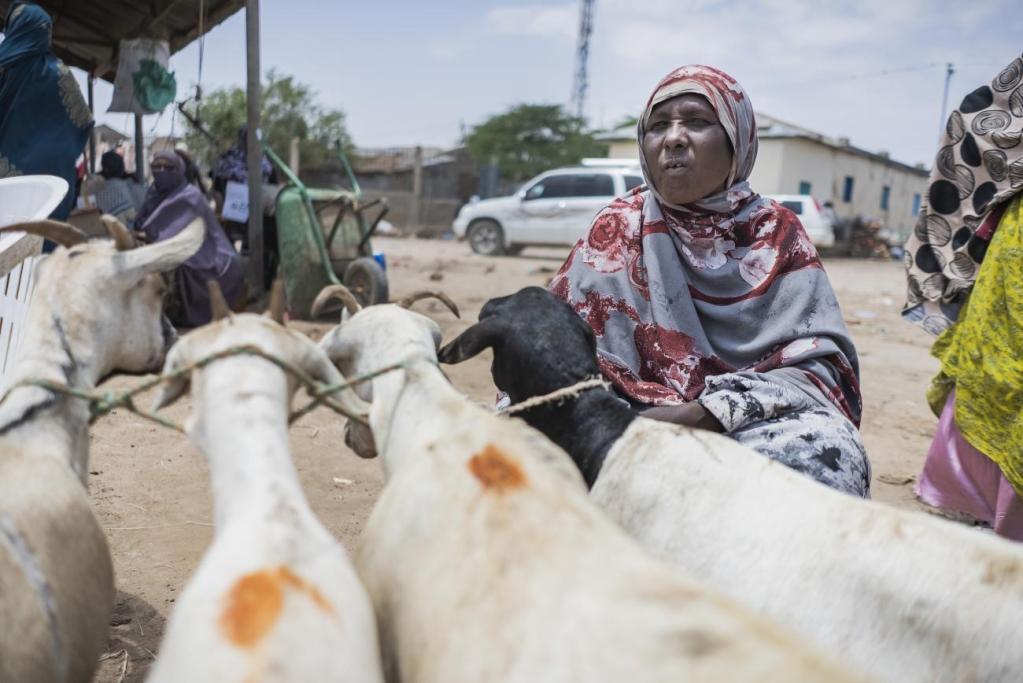
Story
10 June 2025
A round-up of activities of the UN system in Somalia in May 2025
Maritime Security | UNTMIS marks key role of women in Somali maritime sectorUNTMIS joined Somalia’s maritime sector in celebrating the International Day for Women in Maritime at an event in Mogadishu. The event highlighted the important role women play in developing Somalia’s sea-based industries, along with the need for greater female participation. In 2023, the Federal Government of Somalia, with UN support, launched the Women in the Maritime Sector (WiMS) National Action Plan, which aims to enhance and empower Somali women in the maritime sector by increasing opportunities. The UN collaborates with the Federal Government and international partners to foster legal reform, security and capacity-building for the maritime sector.Click here for more Protection | UNHCR holds training for community-based protection focal points in BeletweyneIn May, UNHCR facilitated a comprehensive training for community-based protection focal points and local authorities in Beletweyne, aimed at enhancing their capacity to identify, respond to, and refer protection cases. The training covered core protection principles, safe identification and referral mechanisms, and the importance of survivor-centred approaches. Participants included representatives from government, civil society, and displaced communities, reinforcing a collaborative approach to protection. This initiative is part of UNHCR’s broader efforts to localize protection responses and ensure that those closest to affected populations are equipped to deliver timely, safe, and dignified support. Strengthening the knowledge and skills of frontline responders remains critical in addressing the evolving protection risks in displacement-affected areas. Urban Development | IOM partners develop displacement-sensitive urban plans for Somali citiesDisplacement is a major factor driving Somalia's high urbanization rate, putting pressure on cities like Baidoa. To address this, the Danwadaag Durable Solutions Consortium, led by IOM, has developed displacement-sensitive urban plans for Baardheere, Xudur, and Berdale, aiming to create interconnected and dynamic systems. These plans, emphasizing land governance, infrastructure, and integration of displaced populations, were created collaboratively with data, local authorities, and communities, aligning with national priorities and offering a phased framework for implementation.Click here for more Food Security: FAO and the Ministry of Livestock, Forestry & Range inaugurate fodder storage and processing centres in Dhusamareb The Food and Agriculture Organization of the United Nations (FAO) and Somalia’s Federal Ministry of Livestock, Forestry and Range, in coordination with Galmudug State authorities, inaugurated five fodder storage and processing facilities in Dhusamareb. FAO Representative Etienne Peterschmitt officially handed over the centers to the local community in the presence of Hon. Aden Mohamed, Deputy Minister of Livestock, and Hon. Abdullahi Abdirahmaan, Galmudug Minister of Livestock, alongside state officials, community leaders and project partners. During the mission, Dr Peterschmitt also met the Galmudug Ministers for Livestock and Planning to reaffirm shared priorities for pastoralist livelihoods. The new facilities will allow herders to produce, preserve and market high-quality fodder, narrowing dry-season feed gaps and improving herd health. Delivered through FAO’s resilience programme with support from the Governments of Denmark and Canada, the initiative promotes sustainable, climate-smart livestock production across Somalia. Health | WHO installed solar energy systems in Berbera enhancing delivery of essential health servicesThe World Health Organization with support from the King Salman Humanitarian Aid and Relief Centre has installed solar powered systems across hospitals in Berbera. Frequent power outages that have been used to affect the delivery of essential services have now been addressed. The shift to solar energy is doing more than keeping the lights on; it is energizing the city’s health system by enabling uninterrupted laboratory services, safeguarding lifesaving vaccines, and strengthening the fight against measles and polio, two of Somalia’s most persistent public health threats. Click here for more Security | UNMAS enhance Somali Police Force (SPF) explosive ordinance disposal capability On 25-28 May, UNMAS delivered training on Binary Liquid Explosives (BLE) for a group of ten participants, including Somali Police Force (SPF) Explosive Ordnance Disposal (EOD) personnel and representatives from The HALO Trust. BLE offers a safe and effective alternative to plastic explosives for addressing explosive threats. The three-day training aimed to strengthen participants’ knowledge and skills in the safe and effective management of BLE and enhanced the preparedness of EOD teams supporting both security operations and humanitarian mine action in Somalia. The BLE training marked a significant step in the development of a Somali-led EOD response. Through continued collaboration between the SPF, UNMAS and The HALO Trust, this initiative advances national capabilities to protect communities from the threat posed by explosive hazards and enables stabilization efforts. Maternal Health | UNFPA Marks International Day to End Obstetric FistulaOn 28 May 2025, Somalia observed the International Day to End Obstetric Fistula under the theme "Her Health, Her Right: Shaping a Future Without Fistula." The event in Mogadishu gathered government officials, UN representatives, health professionals, civil society, and survivors. Dr. Mary Otieno, UNFPA Somalia Representative ai, highlighted obstetric fistula as a violation of women's rights, emphasizing the need to address poverty, early childbearing, and inadequate maternal care. State Minister Dr. Maryama Mohamed Hussein noted progress in expanding treatment access beyond a single hospital. Survivor Hamdi shared her journey from isolation to recovery, urging timely maternal care and community support. Despite ongoing challenges, the event underscored a collective commitment to eradicating fistula in Somalia.Click here for more
1 of 5

Story
05 May 2025
A round-up of activities of the UN system in Somalia in April 2025
Shelter | Strengthening land governance and tenure security for IDPS in BaidoaSupported by UN-Habitat and the Global Land Tool Network (GLTN), Baidoa Municipality has collected land data for over 750 households in Waberi and Horseed villages using the Social Tenure Domain Model (STDM). This is following a series of technical trainings held since December 2024, that have equipped the municipality’s land administration team with skills in data collection methods (using both manual and digital tools), data analysis, GIS, and participatory community engagement, laying the groundwork for more inclusive and secure land governance for internally displaced persons (IDPs).These initial outcomes also indicate improved municipal capacity to manage digital land records and increased community awareness of land rights. Investing in data collection initiatives is a strategic move for secure tenure, conflict reduction, and sustainable development. An accurate, up-to-date database is the backbone of effective land governance.Click here for more Protection | IOM opens new centre to enhance protection support for migrants in Hargeisa The International Organization for Migration (IOM) has inaugurated a new Migrant Response Centre (MRC) in Hargeisa to bolster protection and assistance for migrants in the region. This facility aims to provide essential services, including shelter, medical care, and psychosocial support to vulnerable migrants, and particularly those affected by irregular migration routes. The centre also serves as a hub for coordination among stakeholders to address migration challenges effectively. This initiative underscores the commitment to ensuring safe, orderly, and humane migration in line with international standards.Click here for more Economy| UNIDO convenes stakeholders to validate feasibility study on Public-Private Partnership (PPP) UNIDO Somalia hosted a validation workshop in Mogadishu to present and review the draft pre-feasibility study for a Public-Private Partnership (PPP) model under the Jowhar Off-Stream Storage Programme (JOSP). The event brought together key stakeholders, including the Ministry of Agriculture and Irrigation, the Ministry of Energy and Water Resources of the Federal Republic of Somalia, FAO, and other partners. The workshop served as a platform to discuss the study’s findings and gather input to ensure a sustainable and inclusive PPP model that supports the long-term operation and maintenance of the JOSP infrastructure. Participants emphasized the importance of stakeholder engagement, local ownership, and private sector participation in managing the water storage and irrigation infrastructures. This initiative aims to strengthen climate resilience, boost food production, and contribute to Somalia’s agro-industrial development. The validation marks a key milestone in moving toward the implementation of a model that will have a lasting impact on the Lower Shabelle region.Click here for more Child Justice| A milestone in child justice reform: Advancing the Juvenile Justice Bill in Somalia In March 2025, Somalia’s House of the People passed the Juvenile Justice Bill, a pivotal moment in the country’s legal protections for children. Once endorsed by the Upper House, it will replace the 1960 Penal Code and Law No. 13 of 1970, which fall short of providing comprehensive protection for children. It is a culmination of years of technical and financial support from UNICEF, with support from Denmark, the Joint Programme on Human Rights Phase II, and the leadership of the Ministry of Justice and Constitutional Affairs.The Bill profoundly shifts how the Somali child is treated and sets the age of criminal responsibility at 14. It also embraces principles of diversion, restorative justice, rehabilitation, and reintegration. Children in conflict or in contact with the law are treated with dignity, and clear guidelines on arrest, detention, legal aid, and sentencing offer them an opportunity to be reformed rather than punished.Click here for more Food Security| FAO partners launch joint initiative on the future of pastoralismFAO Somalia, in partnership with the Ministry of Livestock, Forestry and Range, and key UN and NGO partners, launched the Future of Pastoralism, a transformative initiative aimed at revitalizing pastoral livelihoods across Somalia’s arid and semi-arid lands. The initiative responds to climate shocks, recurrent droughts, and chronic vulnerability by establishing Pastoralist Development Hubs (PDHs), integrated service centres providing veterinary care, water access, markets, training, and managed rangelands. Anchored in national leadership and community ownership, the initiative is co-implemented with Action Against Hunger, IOM, WHO, and NRC. The launch was officiated by H.E. Deputy Prime Minister Abdisalam Abdi Ali, who emphasized its role in shifting from crisis response to long-term resilience. This marks one of several Joint Transformative Initiatives (JTIs) under FAO’s strategy to reduce humanitarian dependence and strengthen rural development systems, aligned with Somalia’s National Transformation Plan (2025–2029).Click here for more Health| Somalia launches lifesaving vaccines to prevent pneumonia and diarrhoea in children The Federal Republic of Somalia has introduced two lifesaving vaccines into its national immunization programme – pneumococcal conjugate vaccine (PCV) and rotavirus vaccine – aimed at preventing pneumonia and diarrhoea in children. The country has also launched a nationwide measles catch-up campaign to combat one of the leading killers of children in the country. This integrated effort marks a major milestone in Somalia’s journey to reduce the prevalence of measles, pneumonia, and rotavirus-related diarrhoea, 3 of the most prevalent causes of disease and death in Somali children. Click here for more Protection| UNHCR sets up one-stop protection centre in BossasoIn April, UNHCR in Bossaso, in collaboration with the Puntland Ministry of Interior, Federal Affairs and Democratization (MoIFAD), inaugurated a newly constructed one-stop protection centre designed to provide comprehensive and integrated services under one roof. The facility offers legal aid, psychosocial support, registration and documentation, and case management services for refugees, asylum-seekers, internally displaced persons (IDPs), and vulnerable members of the host community.The initiative marks a key step in advancing access to critical protection services while reinforcing national ownership and sustainability of response mechanisms. By integrating services and aligning them with government structures, the centre ensures more efficient, dignified, and coordinated support to those most in need. UNHCR will continue to provide technical assistance to support the delivery of services through this platform. Click here for more Humanitarian| UNFPA supports CHF2025 in Galkayo to strengthen humanitarian coordination.In April, the UNFPA, with funding from the Korea International Cooperation Agency (KOICA), supported the Country Humanitarian Forum, which convened in Galkayo under the Somali Disaster Management Agency (SoDMA) and the Galmudug Ministry of Humanitarian Affairs. Participants included SoDMA leadership, the DG of NIRASomalia, Federal Member State ministers, regional and city administrations, UN agencies, international donors, civil society, and the Union of Islamic Clerics. The forum focused on enhancing coordination, sustainable climate solutions, and emergency response amid poor Deyr rains, an unfavourable Gu season, and La Niña risks. As a quarterly platform, CHF2025 reviewed progress, identified challenges, and set strategic priorities for Somalia’s humanitarian response.Click here for more Political| International partners welcome the proposed platform for Somali leaders In a joint statement issued via UNTMIS, international partners welcomed President Hassan Sheikh Mohamud’s proposal, contained in his Eid al-Fitr message, to establish a platform for Somali political and community leaders. They said that this initiative aims to incorporate their views and efforts into the fight against terrorism and advance Somalia’s state-building goals. The partners also praised positive reactions from key political figures and urged the Federal Government, Federal Member State leaders and other stakeholders to convene swiftly, treating Al-Shabaab’s offensive as an urgent national security priority. They emphasized that rapid progress on political, constitutional, and electoral issues would strengthen international support. Click here for more Security| UNMAS strengthens the Somali National Army’s ability to address explosive ordnance threatsUNMAS Somalia successfully completed a project aimed at strengthening the Somali National Army’s (SNA) capacity to mitigate the threat posed by explosive ordnance, including improvised explosive devices (IEDs), thereby enhancing the safety and security of the people of Somalia. This included the provision of vital equipment for three newly trained SNA explosive ordnance disposal (EOD) teams, along with training materials for a team of SNA instructors. This project, funded by the Government of the UK, will significantly enhance the SNA's operational capabilities and ensure their increasing self-reliance in managing and responding to explosive hazards, ultimately contributing to the government’s long-term goal of assuming full responsibility for mitigating explosive ordnance risks. Click here for more Health| UNOPS supports the construction of the Forlanini hospitalIn April, with the support of the United Nations Office for Project Services(UNOPS), the Ministry of Health of the Federal Government of Somalia held a groundbreaking ceremony to officially launch the construction of Forlanini Hospital in Mogadishu, as part of an effort to enhance emergency response capacity at six hospitals in Somalia. Through the agreement signed between UNOPS and the Ministry of Health, funded by the World Bank, UNOPS is tasked with implementing this project. The scope includes constructing Somalia’s first cold chain facility at Forlanini Hospital and rehabilitating six regional hospitals across Somalia. The project aims to upgrade infrastructure and build emergency response capacity, including for climate emergencies. UNOPS' work includes renovations, civil works, medical equipment installation, and climate resilience measures. This initiative marks progress in healthcare infrastructure and emergency preparedness in Somalia.Click here for more Humanitarian| OCHA convenes meeting of partners to discuss reprioritization of resources In response to recent funding reductions, OCHA and the Inter-Cluster Coordination Group (ICCG) led partners to reprioritize resources to target only the 32 districts with the severe intersectoral needs. The reprioritisation will also focus on lifesaving Clusters – Food Security, Nutrition, Water and Sanitation, Health as well as Protection. Currently, the 2025 Humanitarian Needs and Response Plan is only 10 per cent funded. In response to recent funding reductions, OCHA and the Inter-Cluster Coordination Group (ICCG) led partners to reprioritize resources to target only the 32 districts with the severe intersectoral needs. The reprioritisation will also focus on lifesaving Clusters – Food Security, Nutrition, Water and Sanitation, Health as well as Protection. Currently, the 2025 Humanitarian Needs and Response Plan is only 10 per cent funded. Click here for more
1 of 5
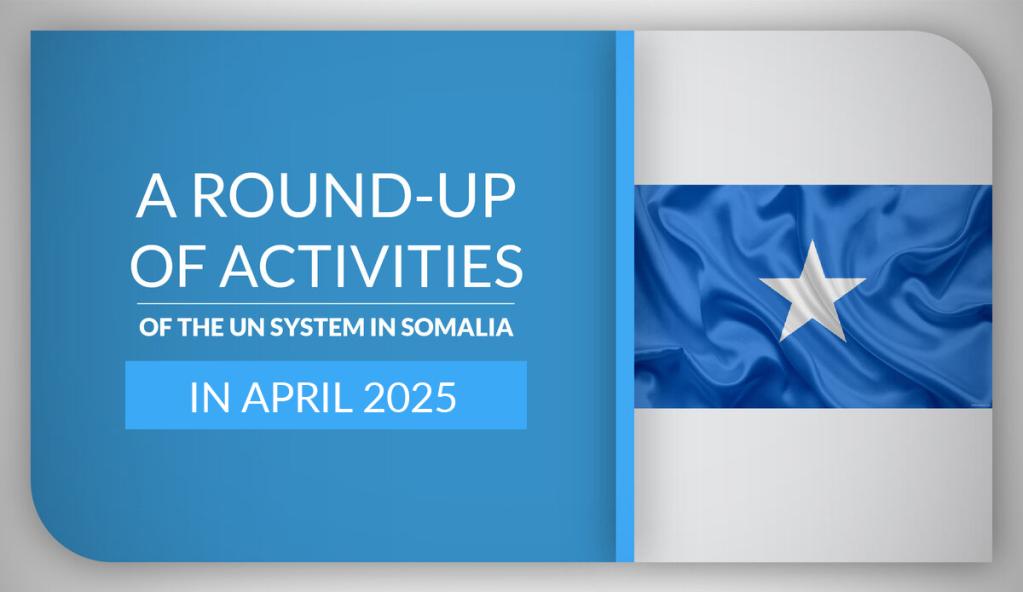
Story
30 March 2025
A round-up of activities of the UN system in Somalia in March 2025
Employment| Somalia Launches Job Portal to Address Unemployment and Boost Economic GrowthThe Somali government has launched a national job portal to combat unemployment and drive economic growth by connecting job seekers with employers through a centralized, government-led platform. This initiative aims to improve labour market efficiency and accessibility across the country. The International Organization for Migration (IOM), in close collaboration with the Federal Ministry of Labour and Social Affairs (MoLSA), provided key technical and operational support to develop and roll out the portal. This support aligns with IOM’s broader efforts to strengthen institutional capacities and promote sustainable employment opportunities in Somalia.Click here for more Economy| UNIDO and IBS showcase achievements made in expanding SME finance in Somalia At the Finance in Common Summit (FiCS) 2025 in Cape Town, organized in the framework of the South Africa Presidency of the G20, UNIDO and the International Bank of Somalia (IBS) highlighted their efforts in expanding SME access to finance in Somalia. The session on "Empowering SMEs Through Innovative Finance" emphasized the need for tailored financial models, stronger public-private collaboration, and technical assistance to unlock SME potential. Key insights included enhancing policy frameworks, leveraging technology, and mobilizing private capital through Public Development Banks (PDBs).Since 2019, UNIDO and IBS have driven financial inclusion through credit facilitation, technical support, and capacity-building. Their collaboration has empowered Somali SMEs, particularly women-led businesses, to access sustainable financing, fostering Political| UNTMIS condemns attack on President’s convoyThe United Nations in Somalia strongly condemned the terrorist attack on a convoy carrying President Hassan Sheikh Mohamud near Villa Somalia in Mogadishu, UNTMIS said in the wake of the 18 March bombing.It added that the world body’s representatives in Somalia expressed their condolences for the attack’s victims, wished a speedy recovery for the injured, and reiterated that they stand shoulder to shoulder with all Somalis against terrorism.In a subsequent statement, UN Secretary-General Antonio Guterres echoed UNTMIS’ response, and reaffirmed the UN’s full solidarity and support to the people and Government of Somalia in furthering efforts towards peace and stability.Click here for more Climate Action| FAO convenes Multi-Stakeholder Forum to Enhance Climate PreparednessThe Food and Agriculture Organization of the United Nations (FAO), in collaboration with the Federal Government of Somalia (Department of Meteorology under the Ministry of Environment and Climate Change), Federal Member States, the Intergovernmental Authority on Development Climate Prediction and Applications Centre, and the World Meteorological Organization, participated in the Somalia Multi-Stakeholder Climate Outlook Forum to present the Gu 2025 seasonal climate forecast (March–May). The forum aimed to inform preparedness and coordination among humanitarian and development partners.The outlook warns of drier-than-normal conditions in most parts of Somalia—including Gedo, Hiraan, Middle Shabelle, Bakool, Bay, Galgaduud, and Mudug—with over a 50 percent chance of below-average rainfall. Above-average temperatures are also expected in Hirshabelle, Galmudug, Puntland, and Somaliland. Variable rainfall onset and extended dry periods could worsen drought conditions, impacting food security, water availability, and livelihoods. FAO urges early action, investment in drought response, and climate-resilient agricultural practices to reduce risks and protect vulnerable communities.Click here for more Protection| UNHCR supports refugee verification initiativeIn March, UNHCR, in collaboration with the Ministry of Interior, Federal Affairs and Democratization (MoIFAD) Puntland, launched a refugee verification and ID provision initiative in Galkayo North. This initiative is part of UNHCR’s mandate to protect and assist displaced populations by ensuring they are legally recognized and can access essential services such as healthcare, education, and livelihood support.Legal identity is a cornerstone of protection. The exercise also plays a critical role in strengthening data accuracy by updating records on population size, demographics, and specific needs. This enables both government and humanitarian actors to design and deliver better-targeted responses. By affirming the legal identity of refugees and enhancing their visibility within national systems, UNHCR is laying the groundwork for stronger protection, inclusion, and durable solutions.Click here for more Women Empowerment| UNFPA Champions Women’s Leadership and Participation in Somali DemocracyOn March 8, 2025, UNFPA Somalia joined UN agencies and NGOs in Mogadishu to commemorate International Women’s Day at an event organized by the Ministry of Family and Human Rights Development. The day brought together government officials, civil society, and development partners in a powerful show of solidarity for Somali women. This year’s focus on empowering women in democracy sparked vibrant discussions on the importance of inclusive governance and the need to amplify women’s voices in leadership. UNFPA remains committed to advancing gender equality and supporting Somali women and girls to lead, participate, and thrive in all aspects of society—for a more just, equitable, and sustainable future.Click here for more
1 of 5
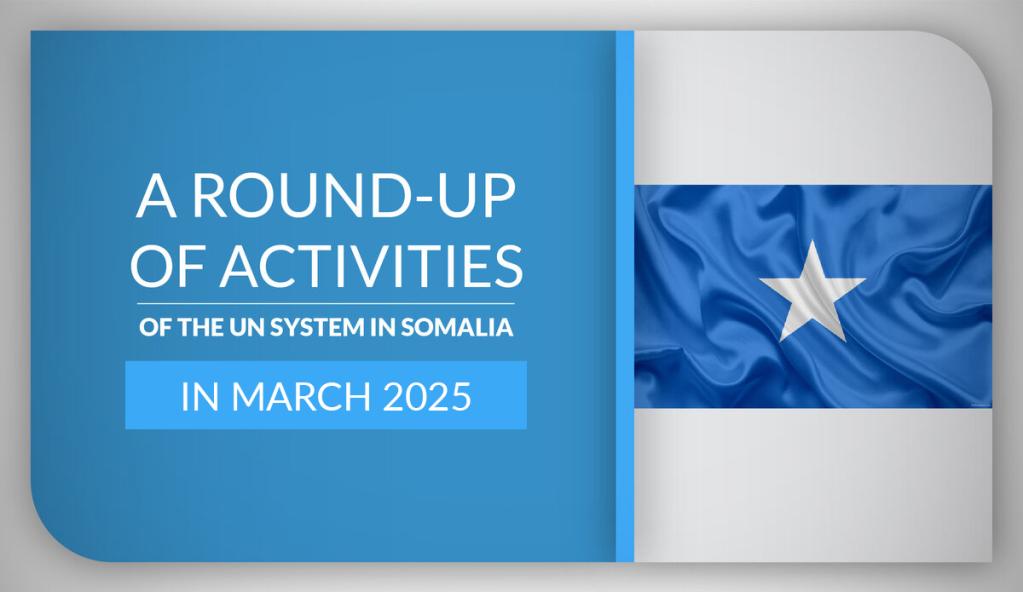
Story
28 February 2025
A round-up of activities of the UN system in Somalia in February 2025
Governance| UN-Habitat advances Institutionalization of the Mayors’ Forum in SomaliaUN-Habitat facilitated a two-day workshop hosted by the Ministry of Interior, Federal Affairs, and Reconciliation to institutionalize the Mayors’ Forum in Somalia. Attended by mayors and Directors General from Federal Member States, the workshop clarified the forum’s structure, its distinction from Local Government Associations, and the implications of ministry-led versus government-led approaches.UN-Habitat has been supporting local governance strengthening, including providing Local Leadership Management training to new local leaders. In 2022, UN Habitat facilitated Somali mayors to attend a Mayor’s forum in Kigali. In 2023, the first Somali Mayor’s forum was held in Mogadishu. During the workshop, participants discussed choosing the pathway to the transition to a local government association, which will enhance dialogue, inter-state cohesion, and service delivery, reinforcing local governance and urban development in Somalia.Click here for more Humanitarian| OCHA conducts Rapid Humanitarian Needs assessment In February, OCHA initiated a rapid needs assessment to address the ongoing drought conditions. Trained enumerators have been deployed to selected sites across the country to gather critical data. The results of this comprehensive assessment will provide humanitarian agencies with a clearer understanding of the situation and inform the response strategies. Furthermore, OCHA is developing a drought preparedness response plan targeting priority districts. Many regions of Somalia are experiencing escalating drought conditions, exacerbating an already critical humanitarian crisis. The situation follows the poor performance of October-December 2024 deyr rains, raising concerns about a potential large-scale crisis in Somalia.Click here for more Health| UNFPA commemorates International Day for Zero Tolerance for FGMOn 11 February 2025, UNFPA and partners celebrated the International Day for Zero Tolerance for FGM, reaffirming their commitment to ending the practice in Somalia. In collaboration with the government and UN agencies, the event featured Deputy Special Representative of the Secretary-General, Resident Coordinator, and Humanitarian Coordinator Mr. George Conway, who reaffirmed global support. Minister of Women, Family, and Human Rights Development Khadija Mohamed Al-Makhzoumi called for a legal ban on FGM. Government officials and female MPs voiced commitment, survivors shared painful testimonies, and religious leaders, CSOs, and media pledged support. The event concluded with a signed commitment to intensify efforts, reinforcing Somalia’s dedication to protecting women and girls.Click here for more Economy| UNHCR hands over Newly Constructed Market in KismayoIn February, UNHCR, in collaboration with its partner COOPI, handed over newly constructed markets in the Luglow Integrated Settlement and Kaharey IDP site in Kismayo. More than just a place for trade, these markets serve as a lifeline, providing families with the means to earn a living, access essential goods, and regain a sense of normalcy. They create spaces where hope is rekindled, and communities can thrive together. By strengthening local economies and fostering social cohesion, UNHCR continues to stand with displaced communities on their path to a brighter, self-sufficient future.Click here for more Disability Inclusion| UNDP conducts Sign Language Training for Hearing Impaired IndividualsIn Mogadishu, 25 individuals with hearing disabilities successfully graduated from a three-month Somali Sign Language training conducted by the Somali National Disability Agency in partnership with UNDP Somalia and supported by the King Salman Humanitarian Aid & Relief Centre.This initiative strengthens inclusive communication, improves access to essential services, and cultivates a skilled pool of Somali Sign Language professionals to support greater social and economic inclusion.Click here for more Climate Action| FAO, Somali Government, and GCF launch the Climate Resilient Agriculture project.In February, FAO, in partnership with the Government of Somalia and with funding from the Green Climate Fund (GCF), launched the Climate Resilient Agriculture in Somalia (Ugbaad) project in Mogadishu—the first-ever GCF-funded climate project in Somalia.The initiative, approved in October 2024, aims to restore 41,800 hectares, directly benefiting 1.15 million people and enhancing climate resilience for 2.1 million individuals. It will promote sustainable agriculture, climate-resilient inputs, water accessibility, and improved market access.The launch was attended by Somalia’s Deputy Prime Minister, His Excellency Mr. Salah Jama, UN Resident and Humanitarian Coordinator, Mr. George Conway, FAO Regional Representative for Africa, Mr. Abebe Haile-Gabriel, and key government officials. The leaders emphasized the importance of integrating climate resilience into national policies, ensuring sustainable solutions for farmers, agro-pastoralists, and pastoralists.Click here for more Human Rights | UNTMIS holds Film Production Workshop for Young Somali FilmmakersIn recognition of their achievements in the inaugural Human Rights Short Film Competition in Somalia (HRSFCS), 14 talented young Somali filmmakers participated in a specialized, UN-backed filmmaking workshop in Mogadishu.Led by renowned Somali filmmaker Abshir Rageh, the workshop aimed to enhance participants’ technical skills and empower them to communicate compelling narratives about human rights issues in Somalia through film. They explored innovative storytelling techniques, covering pre-production, production and post-production. Guest speakers included the National Theatre of Somalia’s Director Osman Abdullahi Gure, and the Chief of Strategic Communications and Public Affairs Group for the UN Transitional Assistance Mission in Somalia (UNTMIS), Ari Gaitanis.Organized by the National Theatre and the United Nations, in cooperation with the Ministry of Family and Human Rights Development and the Ministry of Information, Culture and Tourism, the HRSFCS took place in 2023.Click here for more Climate Resilience | UNICEF joins Partners on Project to Pilot Recharging Water aquifers in DollowUnpredictable rainfall and population growth are making water scarcity a big global issue. The World Economic Forum even calls it one of the top risks for development this decade.To tackle this, we need to find better ways to collect and use water, especially in dry areas. Rapid floods, often seen as hazards, can help if managed well.UNICEF has partnered with the Ministry of Environment, Water, and Resources to pilot a project to recharge the aquifer in Dollow. Dubbed the Managed Aquifer Recharge project, its aim to improve water supplies in arid regions by involving local communities and experts in building and maintaining water systems and creating a model that can be used in other countries. Click here for more Food Safety| UNIDO convenes inter-ministerial meeting on Food Safety UNIDO Somalia successfully convened a kick-off meeting in February with four key ministries: Ministry of Commerce & Industry, Ministry of Agriculture, Ministry of Livestock, and Ministry of Fisheries & Blue Economy. The meeting convened under the Somalia Agri-food Value Chain Development Programme funded by the European Union is part of efforts aimed at enhancing food safety systems and trade facilitation to strengthen Somalia’s agricultural sector. The discussions focused on institutional capacity building, quality standards and certification, livestock value addition, and challenges in fisheries and agriculture. Stakeholders emphasized aligning with international standards, improving market access, and fostering private sector engagement. The meeting concluded with actionable recommendations, including exploring solar-powered cold storage and enhancing inter-agency coordination, to drive sustainable economic growth and job creation.Click here for more
1 of 5
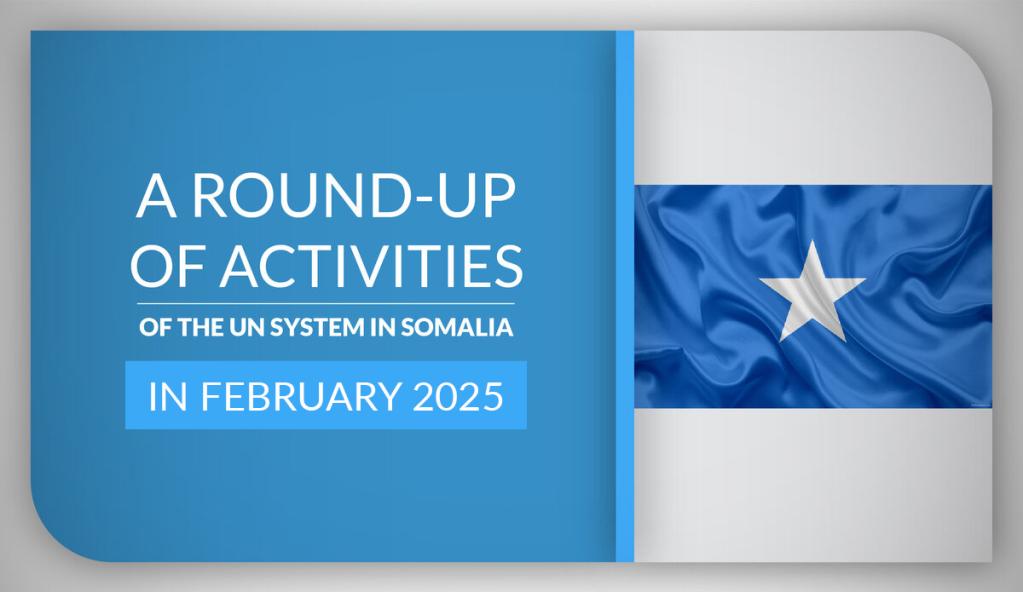
Story
18 February 2025
Somalia Marks International Day for Zero Tolerance for FGM
11 February 2025, Mogadishu, Somalia – The International Day for Zero Tolerance for Female Genital Mutilation (FGM) was commemorated with a powerful gathering of key stakeholders, survivors, government officials, and international partners in Mogadishu. The event underscored the urgent need to end FGM and strengthen the collective commitment to protecting Somali women and girls from this harmful practice.The commemoration commenced with the registration and welcome of attendees, followed by a compelling video highlighting the devastating effects of FGM as well as the significant efforts made and strides achieved in combatting FGM, showcasing the progress of various initiatives, awareness campaigns, and policy advancements aimed at eradicating the practice. These visuals set the tone for an impactful session of keynote messages and speeches from leaders advocating for change.A Call for Change and SolidarityGeorge Conway, Deputy Special Representative of the Secretary-General, Resident Coordinator, and Humanitarian Coordinator (DRSG/RC/HC), emphasized the international community’s support for Somalia’s movement against FGM.“We are here to support Somali citizens’ desire for change,” he stated. “We need to show solidarity with survivors and the violence faced by Somali women, including child and forced marriage. We are here to support women and girls to achieve the change that the people want.”Government Commitment and LeadershipH.E Amb Khadija Mohamed Al-Makhzoumi, Minister MoFHRD H.E. Amb Khadija Mohamed Al-Makhzoumi, Minister of Women, Family, and Human Rights Development (MoFHRD), delivered opening remarks stressing the lifelong struggles faced by Somali women due to FGM.“We have enough evidence to back up the severe health issues of FGM practice, and today we stand steadfast in our commitment to abandoning this harmful practice,” she declared.She further called for legislative action, urging society to rally behind the passing of a law banning FGM. “We should support passing the law banning FGM while collaborating closely with every member of our society, including teachers, youth, religious leaders, and families.”Goodwill Messages and Collective EffortsThe event featured goodwill messages from key government officials, including Deputy Minister of Youth, H.E. Mohamed Abdulkadir Haji, and Minister of Health, H.E. Maryan Mohamed Hussein. Female Members of Parliament and former Minister Maryan Qasim also voiced their unwavering commitment to ending FGM.Survivor Testimonies: Voices of Strength and ResilienceThe heart of the event was the survivor experience-sharing session, where two survivors courageously shared their painful experiences with FGM. Their testimonials shed light on the deep emotional and physical scars left by the practice and reinforced the urgency of ending it once and for all.Commitment to ChangeCommunity leaders and partners including survivors, religious leaders, CSOs, and media expressed their unwavering commitment to supporting Somalia in the fight against FGM. They reaffirmed their dedication to working closely with local actors to drive sustainable change and empower women and girls.Panel discussion consisting of survivors, religious leaders, CSOs, and mediaSigning of Commitment The event concluded with the signing of a commitment solidifying the collective pledge to intensify efforts in eradicating FGM. Attendees agreed that Somalia must take decisive action, through both policy and grassroots initiatives, to protect the future of young girls.As the commemoration ended, a resounding message echoed across the room: Somalia’s young girls deserve a future free from FGM. The time for change is now.
1 of 5
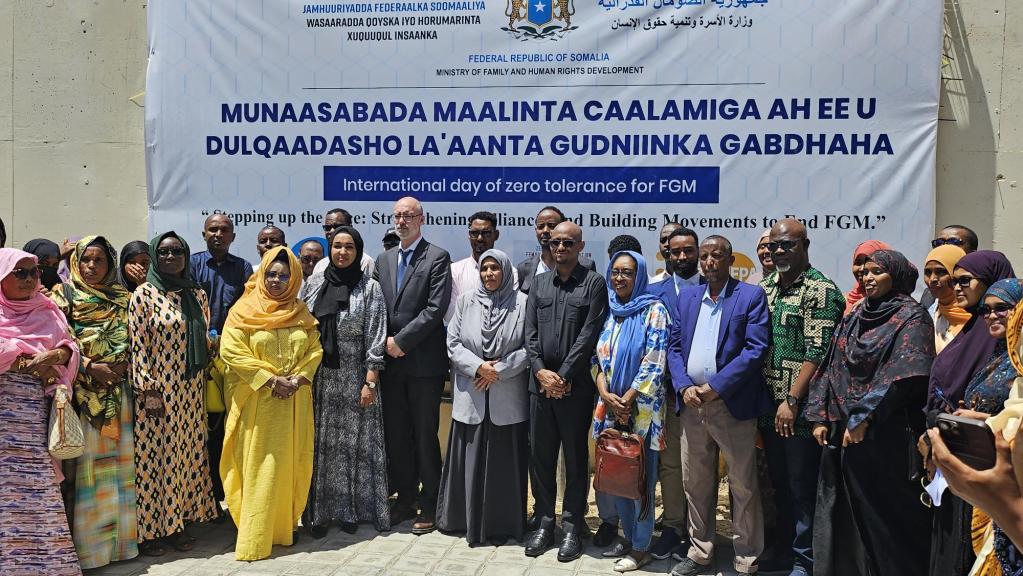
Press Release
23 April 2025
Somalia launches lifesaving vaccines to prevent pneumonia and diarrhoea in children
The Federal Republic of Somalia has introduced 2 lifesaving vaccines into its national immunization programme – pneumococcal conjugate vaccine (PCV) and rotavirus vaccine – aimed at preventing pneumonia and diarrhoea in children. The country has also launched a nationwide measles catch-up campaign to combat one of the leading killers of children in the country.This integrated effort marks a major milestone in Somalia’s journey to reduce the prevalence of measles, pneumonia and rotavirus-related diarrhoea, 3 of the most prevalent causes of disease and death in Somali children.The Somali Ministry of Health and Human Services is leading this effort with support from Gavi, the Vaccine Alliance, the World Health Organization (WHO) and the United Nations Children's Fund (UNICEF). It comes at a critical time, as Somalia grapples with persistent measles outbreaks and deaths caused by pneumonia and rotavirus-related diarrhoea. Together, measles, pneumonia, and diarrhea account for an estimated 43% of child deaths in the country.“The introduction of these 2 vaccines and the launch of the measles catch-up campaign marks a significant step forward in our national effort to reduce child deaths and build a healthier future for Somalia’s next generation,” said Somalia’s Federal Minister of Health Dr Ali Haji Adam. “The government is committed to investing in the health of our children and strengthening our immunization services in partnership with global and regional health partners.”Pneumococcal infections can cause serious conditions such as pneumonia, meningitis and septicemia. Rotavirus is a leading cause of severe diarrhoea and dehydration, contributing significantly to malnutrition and mortality in children. Countries that have introduced PCV into their routine immunization programmes have reported marked declines in hospitalizations and deaths among children.This milestone is made possible through Gavi’s revised support framework for fragile, emergency-affected and displaced populations, which offers flexible and targeted assistance to countries like Somalia where immunization systems have been weakened by recurring crises.“We commend the Federal Ministry of Health, frontline health and community workers and other stakeholders involved for their commitment to introduce these 2 critical vaccines amid multiple competing priorities,” says Gavi’s Senior Country Manager for Somalia Patience Musanhu. “Given the burden of these diseases in Somalia, this is an investment well worth making, one that will save lives and have a transformative impact on health and development, families, communities and the health system. Gavi remains committed to working with the government and partners to support the vision of a healthier, more prosperous future for Somalia.” The measles catch-up campaign is designed to rapidly close immunity gaps among children who have missed routine vaccinations due to insecurity, displacement and service disruptions. The campaign aims to reach millions of children across the country, protecting them from one of the most contagious and deadly vaccine-preventable diseases.“This is more than just a vaccine launch, it is a promise to Somalia’s children that their lives matter, their health matters,” said WHO Representative a.i in Somalia Dr Kamil Mohamed Ali. “For years, we have witnessed too many young lives lost to diseases. With these new vaccines and the measles catch-up campaign we are turning the tide and reaffirming our commitment to equity, access and a healthier future for all.”“The introduction of these 2 vaccines is a big win for children in Somalia,” said UNICEF Representative Wafaa Saeed. “By this action, and with the measles campaign, we will be preventing nearly half of the deaths that occur every year among young children in Somalia, sparing families from the grief and sorrow of losing their loved ones. These children will be given an opportunity to grow up, realize their dreams and contribute to their nation’s progress.” The integrated launch reflects the strong collaboration between the Somali Government and its health partners in expanding equitable access to essential health services. Together, they are working to protect every child in Somalia from preventable diseases and lay the foundation for a more resilient and healthier future.
1 of 5
Press Release
09 April 2025
The Federal Government of Somalia, United Nations launch Joint Initiative - Food Systems for Somalia Project.
Mogadishu, 9 April 2025 - The Federal Government of Somalia, in collaboration with the United Nations today launched a two-year programme aimed at strengthening food systems in Somalia.The joint programme HIT Food Systems for Somalia Project, to be implemented by the Food and Agriculture Organization of the United Nations (FAO), the United Nations World Food Programme (WFP), marks a milestone in Somalia’s journey to strengthen food systems governance, integrate social protection, and enhance resilience through nutrition-sensitive and climate-adaptive approaches. Delivering the key remarks at the launch event, the Deputy Prime Minister, His Excellency, Mr. Salah Ahmed Jama highlighted transforming food systems is critical to Somalia’s state-building efforts. “Our journey to transform food systems is deeply tied to Somalia’s broader nation-building efforts. As we advance toward debt relief, recovery, and long-term development, food systems must be at the heart of our resilience architecture. This means securing long-term financing for food systems investments, building public-private partnerships that prioritize local markets and empower communities, especially women and youth, as agents of transformation. This Joint programme funded by SDG Fund lays the foundation for these aspirations,” Speaking at the event, UN Resident and Humanitarian Coordinator for Somalia, Mr. George Conway emphasized the UN's collective commitment to supporting Somalia's food systems efforts.“Addressing food insecurity in Somalia requires a whole-of-system approach to food systems. The aim of this programme is to have a transformative and catalytic impact, significantly advancing national food security and self-reliance in Somalia. We are pleased that it fully aligns with the Government of Somalia's vision outlined in the National Transformation Plan 2025-2029,” said Mr. George Conway.The programme will directly support 28 000 people with 10 000 people (government staff, community leaders, service providers), reached through capacity building both at the subnational and national levels in the target locations. FAO Head of Programme, Ezana Kassa, stated the importance of joint programming in transforming agrifood systems.“This joint programme is a key step in operationalizing Somalia’s National Food Systems Pathways by linking nutrition-sensitive, climate-adaptive social protection with resilient agrifood systems. By strengthening governance, inclusive engagement, and data-driven decision-making, we aim to build a more sustainable and equitable future. Integrating climate-smart livelihoods, early warning, and financial inclusion will help transform food systems to be more resilient, inclusive, and efficient—leaving no one behind”.National and local policies related to food systems and social protection will potentially benefit all citizens, particularly the most vulnerable and food insecure populations, especially with 4.6 million people in Somalia could face crisis hunger by June 2025. WFP Somalia Deputy Country Director Marco Selva, weighed in, saying “Somalia faces multiple, interconnected challenges—food insecurity, economic fragility, and social vulnerabilities—that threaten lives, livelihoods, and long-term development. This SDG-funded joint programme is a partnership between UN agencies and the Government, investing in long-term solutions and food systems transformation to create greater collective impact and enhance the well-being and resilience of communities in Somalia”The joint programme will provide economic inclusion support—including skills development and livelihood assistance—to approximately 8 000 participants identified through the Unified Social Register. The focus will be on the most vulnerable individuals, including pregnant and lactating women, unemployed youth, female-headed households, children living with disabilities, as well as smallholder farmers with productive capacity.
1 of 5
Press Release
25 February 2025
Drought, conflict and high food prices could push 4.4 million people into hunger, the Federal Government of Somalia and UN warn
MOGADISHU, Somalia, 26 February 2025 - New data from Somalia shows that 4.4 million people could face hunger by April 2025, driven by worsening drought conditions, conflict and high food prices.The Federal Government of Somalia and the United Nations agencies warn that without adequate funding for humanitarian action, the country - which in 2022 was pushed to the brink of famine by severe drought, resulting in thousands of deaths, with nearly half being children - could once again face deepening hunger. Today’s warning from the Somali Disaster Management Agency (SoDMA), the Food and Agriculture Organization of the United Nations (FAO), the United Nations Office for the Coordination of Humanitarian Affairs (OCHA), the United Nations Children’s Fund (UNICEF) and the UN World Food Programme (WFP) comes as the latest Integrated Food Security Phase Classification (IPC) analysis shows that 3.4 million people are already experiencing crisis-levels, or higher, of hunger in Somalia (IPC3+). This number is projected to rise to 4.4 million (23 per cent of the population) between April and June 2025, when below-average Gu rains are forecast. "Worsening drought poses a severe threat to communities already grappling with immense hardship and ongoing conflict. Urgent action is required to save lives, protect livelihoods, and prevent further suffering," said His Excellency Mohamuud Moallim, Commissioner of the Somali Disaster Management Agency (SoDMA). "This time, we are not only confronting the devastating impacts of drought but also compounding risks, including conflict and an unprecedented decline in humanitarian funding. These overlapping crises demand immediate, collective and well-coordinated action to strengthen Somalia’s resilience and safeguard our most vulnerable communities."The hardest-hit households include those with low agricultural yields who have depleted their food stocks, internally displaced persons (IDPs), and pastoralists with limited livestock and below-average earnings from livestock sales.“Worsening drought, erratic rainfall, and ongoing conflict are eroding livelihoods, pushing families deeper into crisis,” said FAO Somalia Country Representative Etienne Peterschmitt. “FAO is responding by scaling up its support for increased agricultural production, promoting climate-smart solutions, and strengthening resilient agrifood systems. Through early warning systems and anticipatory action, we help communities prepare for shocks before they escalate, mitigating the worst impacts of food crises.”Acute funding shortfalls have resulted in life-saving programmes being reduced or cut altogether. The UN is calling for more urgent funding to scale up food assistance, nutrition support, water and sanitation services, as well as livelihood initiatives to mitigate the impacts of the expected drought in Somalia. Today, the 2025 Somalia Humanitarian Needs and Response Plan, calling for US$1.42 billion, is only 12.4 per cent funded.“Recurrent climate shocks, protracted conflict, disease outbreaks and widespread poverty, among other factors, have aggravated the humanitarian crisis in Somalia. Aid agencies are doing their best to save lives, but they urgently need adequate funding to meet the most critical needs at this juncture in Somalia,” said Crispen Rukasha, Head of Office, OCHA Somalia. An estimated 1.7 million children under the age of five face acute malnutrition through December 2025. Of those, 466,000 face severe acute malnutrition – an increase of nine per cent compared to the same period last year. Nearly two-thirds (64 per cent) of the total malnutrition burden is concentrated in southern Somalia, where drought conditions and insecurity are the worst."Past climate events demonstrate that children are the most affected, facing severe malnourishment and diseases that increase their risk of death and long-term developmental issues," said Nisar Syed, UNICEF Somalia Representative Officer in Charge. "As prevention is key, UNICEF provides access to clean water and sanitation, provides micronutrients, trains caregivers to identify early signs of malnutrition and operates in remote areas. Given the recurring nature of these crises, we must emphasize a multi-sector approach while working with all stakeholders and the Government to invest in resilience, anticipatory action and a robust health system."The IPC findings also confirm that erratic rainfall in 2024 led to low crop yields, rapid depletion of pasture and water sources, flooding of food crops, and displacement of hundreds of thousands of people.“Recurrent shocks such as droughts are leaving millions of Somalis at risk of hunger as food prices increase and harvests dwindle. Famine was narrowly avoided in 2022 due to large-scale humanitarian support, which is needed again to provide immediate assistance while implementing longer-term solutions. However, funding shortfalls are forcing us to prioritize and reduce assistance at the worst possible time,” said El-Khidir Daloum, WFP’s Country Director in Somalia.
1 of 5
Press Release
22 January 2025
Humanitarian partners seek US$1.42 billion to assist 4.6 million people in Somalia in 2025
Today, the Federal Government of Somalia, the United Nations and humanitarian partners released the 2025 Humanitarian Needs and Response Plan (HNRP), which seeks US$1.42 billion to assist 4.6 million people out of 5.9 million who need lifesaving humanitarian and protection assistance in Somalia.“Across Somalia, as a result of recurrent shocks, food insecurity and malnutrition remain widespread,” said Mr. George Conway, Deputy Special Representative of the UN Secretary General, Resident and Humanitarian Coordinator for Somalia. “Humanitarian and development partners will be working towards a more integrated response that is informed by the priorities of affected communities and delivered through decentralized coordination structures.”In 2024, the humanitarian situation in Somalia saw slight improvements as compared to previous years, which were marked by widespread conflict, devastating droughts and flooding. The improvements are linked to investments in early warning, preparedness and improved collaboration between the humanitarian community and the authorities, and increased response capacity of the Government, led by the Somalia Disaster Management Agency (SODMA).“The Somali Government remains committed to leading and coordinating the national response in close collaboration with our humanitarian partners, development agencies, and the international community,” said Mr. Mohamud Moalim, Commissioner, SODMAThe 2025 HNRP focuses on lifesaving and life-sustaining assistance for people with the most severe levels of needs and incorporates humanitarian response gaps analysis into the inter-cluster prioritization methodology, reinforcing commitments to leave no one behind. The plan advocates for scaled-up development and climate financing to address the structural drivers of needs, build resilience, reduce the risk of future disasters“We are committed to provide lifesaving assistance to those most in need, particularly vulnerable groups such as women, children, and the elderly,” said Mr. George Conway. ‘’I call upon international community to support our efforts with urgent funding and resources, ensuring that no one is left behind in this ongoing crisis.”
1 of 5
Press Release
21 January 2025
New study estimates that 71,000 drought-related “excess” deaths may have occurred in Somalia between 2022-2024
Mogadishu, 21 January 2025 – A study released today by the Federal Ministry of Health, WHO and UNICEF estimates that 71,100 people may have died between January 2022 and June 2024 because of the drought that ravaged large parts of Somalia in 2022. About 40 per cent of these deaths were estimated among children under the age of 5.The report, From insight to action: an update on mortality patterns in Somalia, was released today in Mogadishu by the Minister of Health Dr. Ali Hadji Adam Abubakar. In attendance were Mr. George Conway, Deputy Special Representative of the UN Secretary-General and Humanitarian Coordinator, Ms. Wafaa Saeed, UNICEF Representative, and Dr. Reinhilde Van de Weerdt, WHO Representative.The study, the fifth and final report in a planned series, provides a retrospective analysis of the impact of the drought on population mortality across Somalia during a 30-month period, which includes the 2022 drought which affected 7.9 million people, nearly half the population, and brought the country to the brink of famine. With the concerted efforts of the Government of Somalia and its humanitarian partners, famine was narrowly averted but Somalia was left counting the residual toll on human lives.Commissioned by UNICEF and WHO and carried out by the London School of Hygiene and Tropical Medicine, Imperial College London, and Somalia’s SIMAD University, the study is an update on the first report published in March 2023 which estimated 43,000 excess deaths attributable to the 2022 drought. This latest study observes that most excess deaths occurred in the south-central regions of Somalia, including Banadir, Bay, and Lower Shabelle. Despite high levels of food insecurity, the north-east regions experienced relatively low levels of mortality.“For my Ministry, our focus is on creating a strong and robust health system as the cornerstone of a healthy and thriving Somali society,” said Health Minister Dr. Ali Hadji Adam Abubakar. “At the heart of this approach is delivering health and nutrition services in an integrated manner, at the lowest unit of the health delivery chain, and in a way that gives priority to vulnerable children and women.”“The findings of this study highlight the profound impact that the 2022-2024 drought has had on the lives of the Somali people. With over 70,000 deaths, the majority of which were children, this is a stark reminder of the urgent need for continued support and resilience-building efforts in Somalia,” said WHO Representative Dr Renee van De Weerdt Renhilde. “This also underlines the critical importance of strengthening Somalia’s Health Emergency Prevention, Preparedness, Readiness and Resilience system to effectively respond to emergencies and provide sustained care for people in need. WHO continues to collaborate with the Somali government and partners to ensure that communities are not only protected during crises, but also empowered to withstand and recover from future shocks.”“This report serves as a serious and sad reminder of the devastating impact of climate change on vulnerable families in Somalia,” said UNICEF Representative Wafaa Saeed. “As resources to respond to humanitarian needs have become more limited, the government and its partners must continue to explore innovative investments to expand the reach of integrated life-saving services including health, nutrition, water, and sanitation. Given the recurring nature of climate-induced crises, we must also scale up investments in community resilience to future shocks, anticipatory action, and prevention of disease outbreaks.”Recurrent shocks, including climatic events such as drought and floods, conflict and insecurity, and disease outbreaks, continue to exacerbate humanitarian needs in Somalia, alongside underlying factors such as widespread poverty, lack of diversified livelihoods and equitable economic growth, insecurity and marginalization, and weak basic service delivery systems.The latest report by the Integrated Phase Classification system, a food security framework that includes governments, UN agencies, NGOs, and others released in September 2024 shows that extreme acute food insecurity remains widespread, with 4.4 million people predicted to experience crisis levels of hunger and 1.6 million children expected to be acutely malnourished this year, placing them at higher risk of death and permanent developmental delay.A summary of the report can be downloaded here.
1 of 5
Latest Resources
1 / 11
1 / 11

